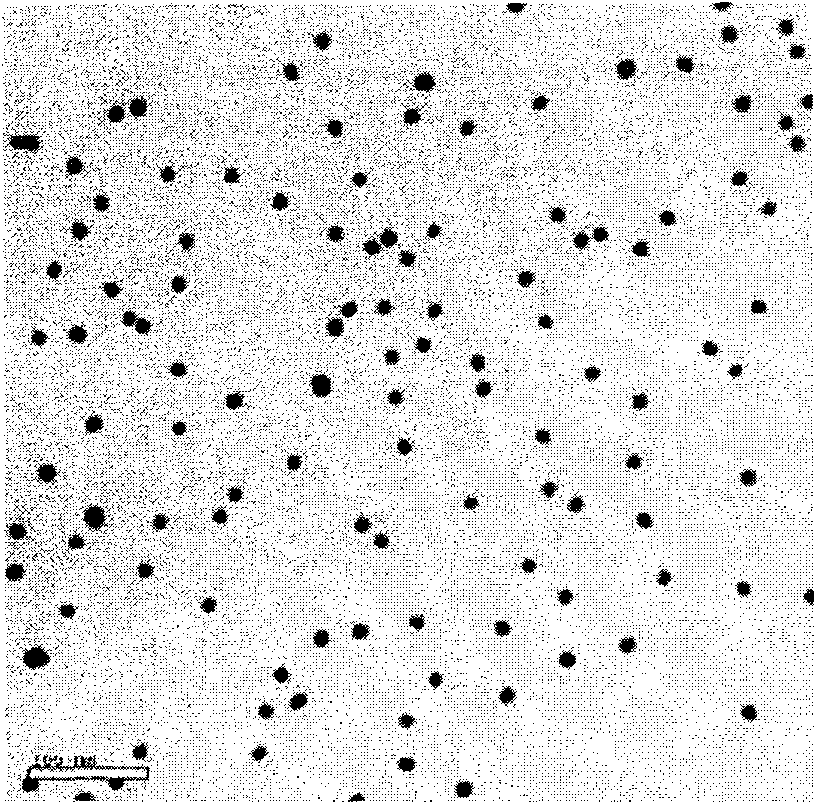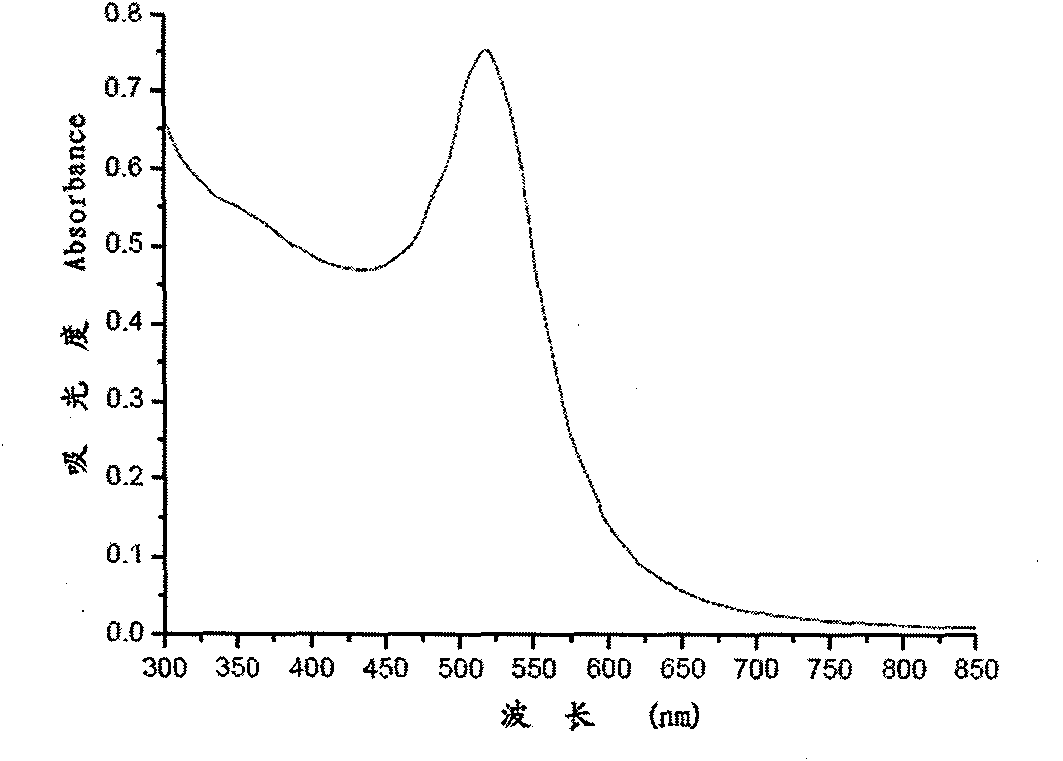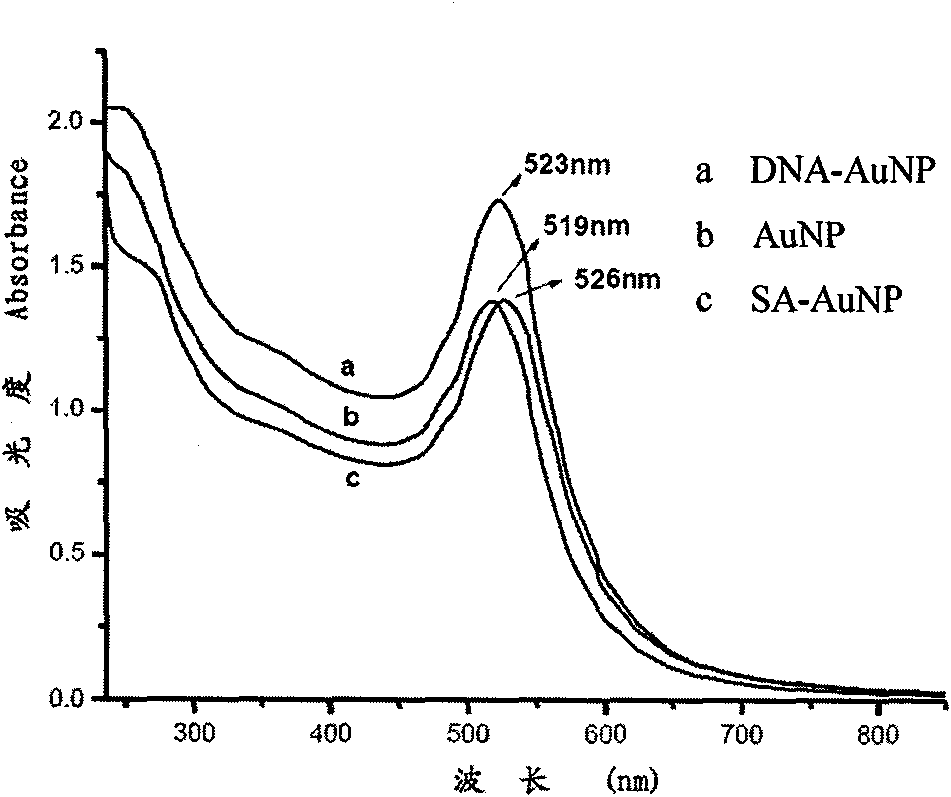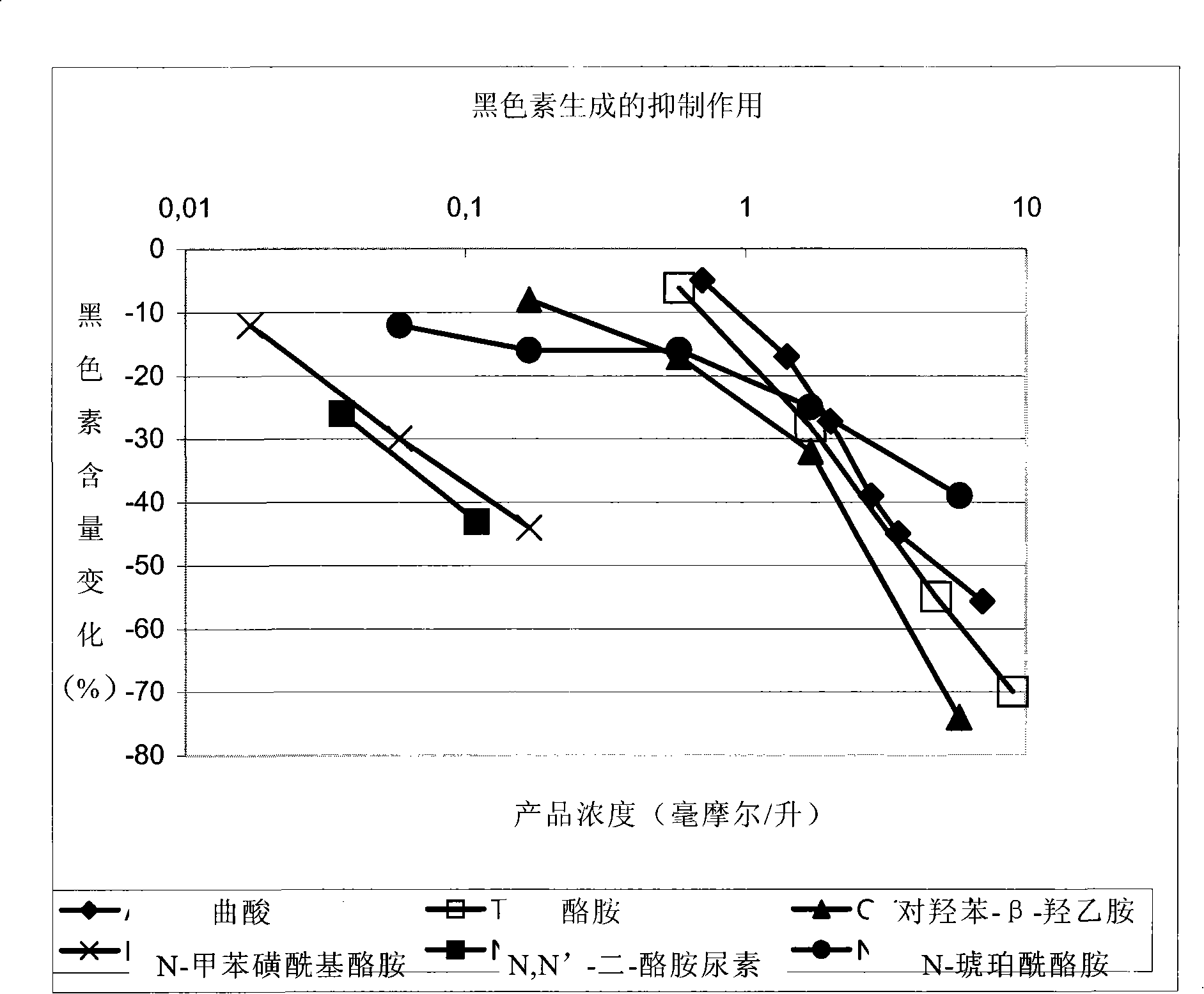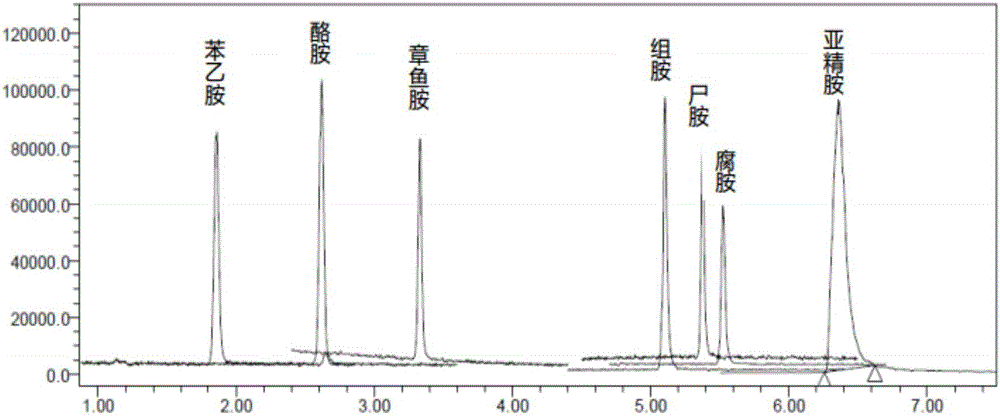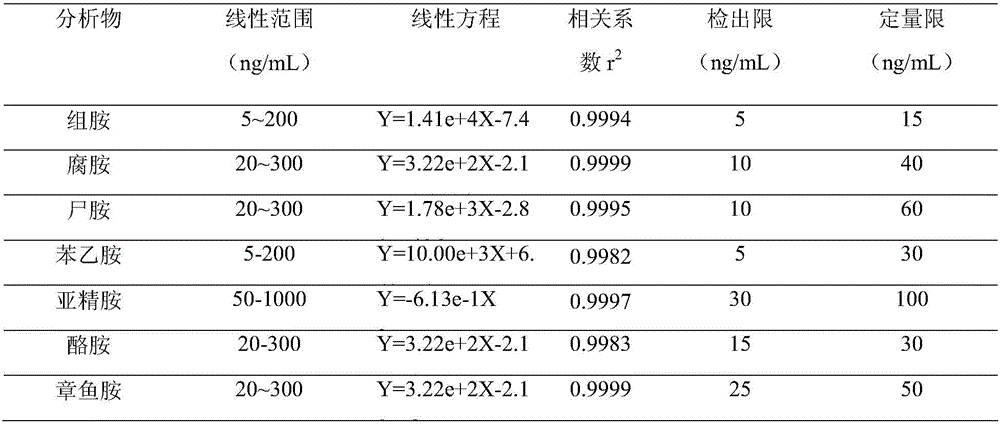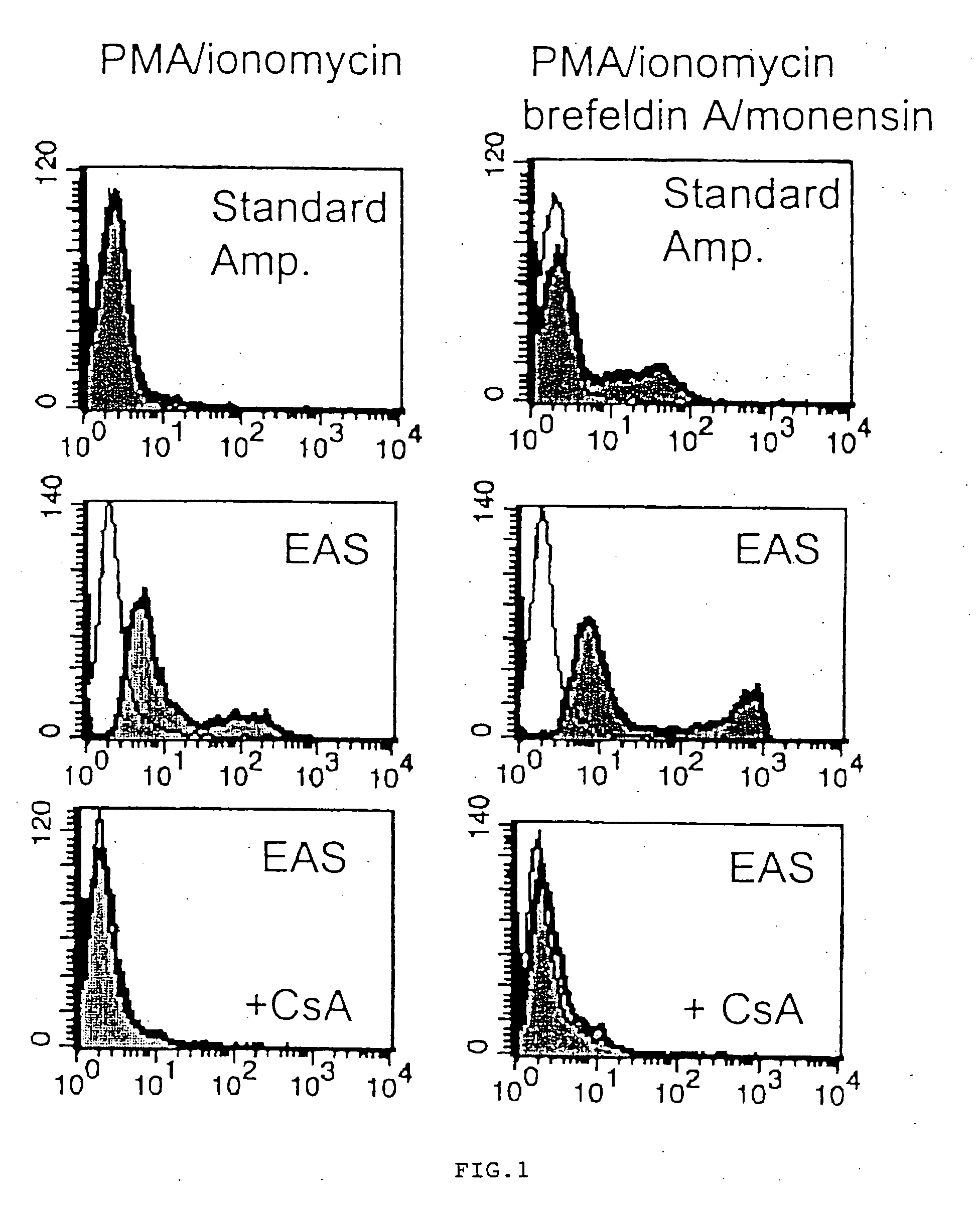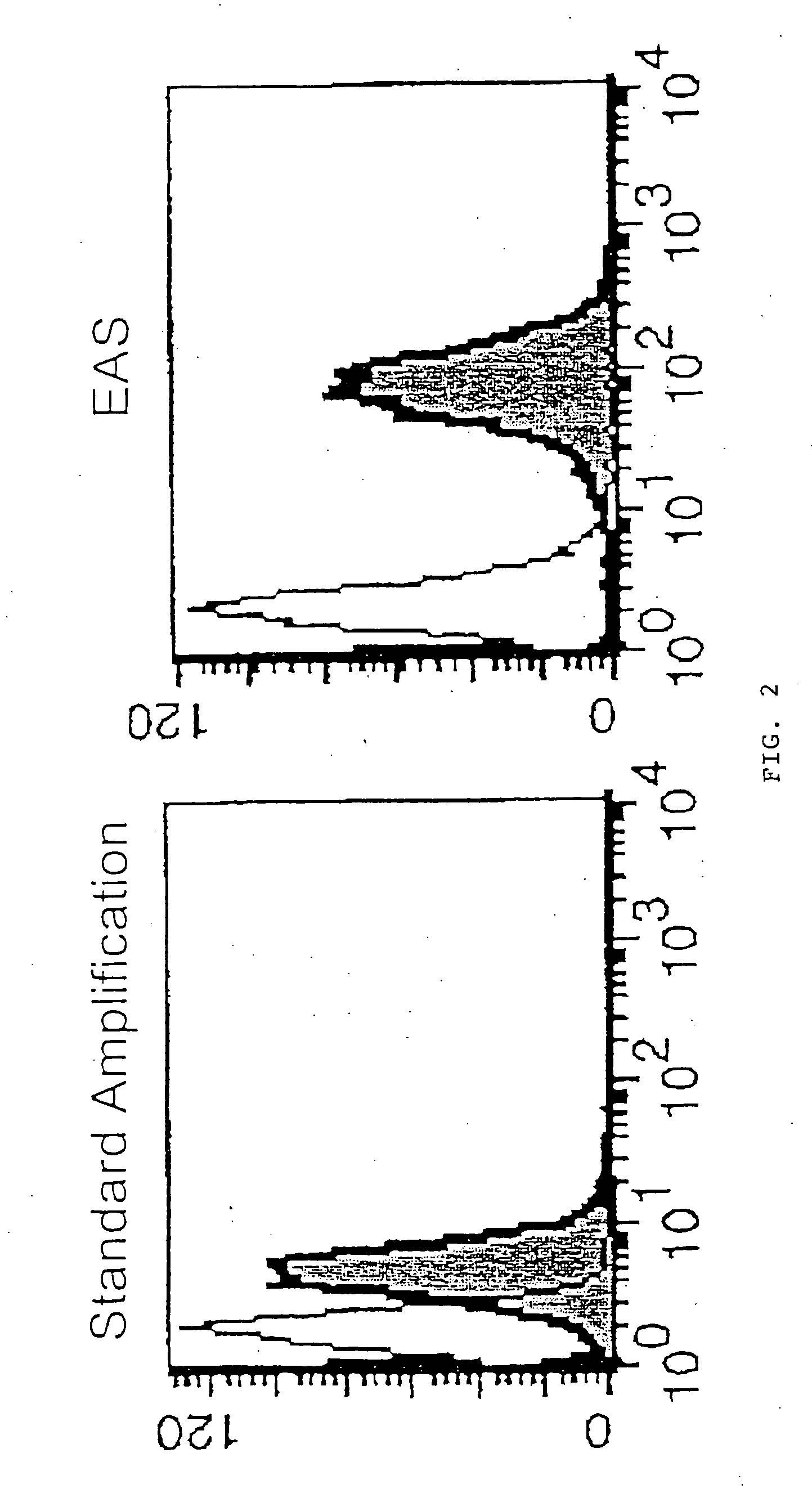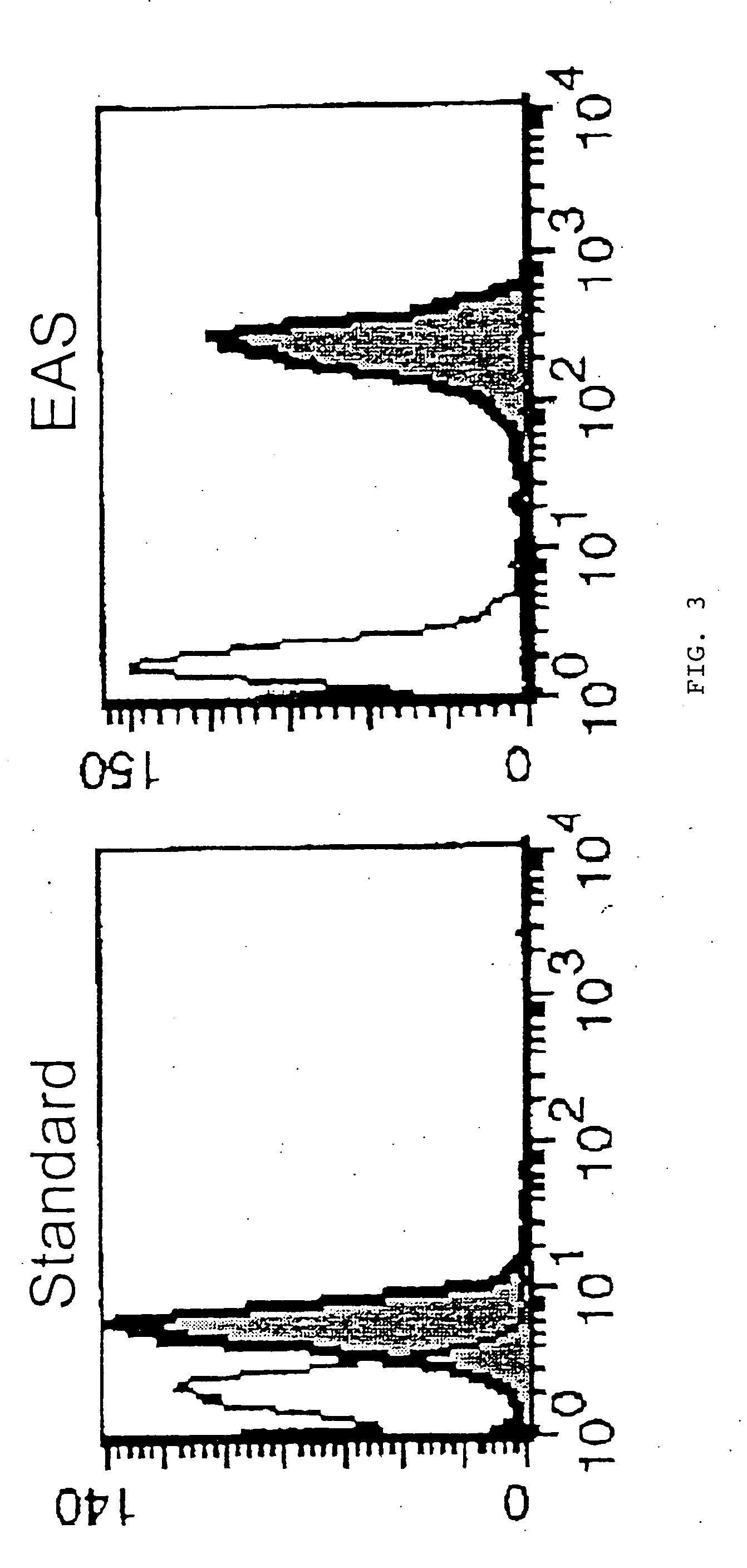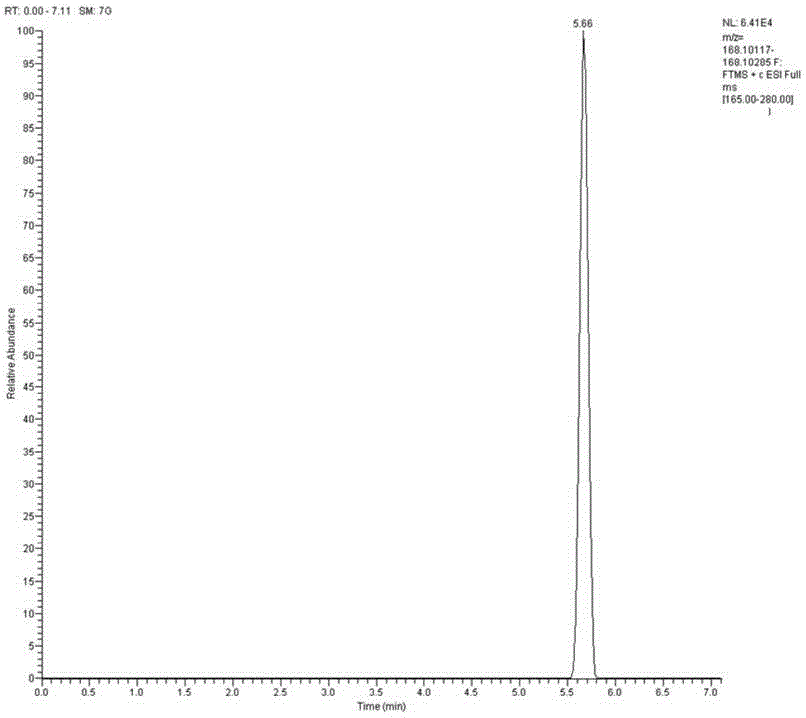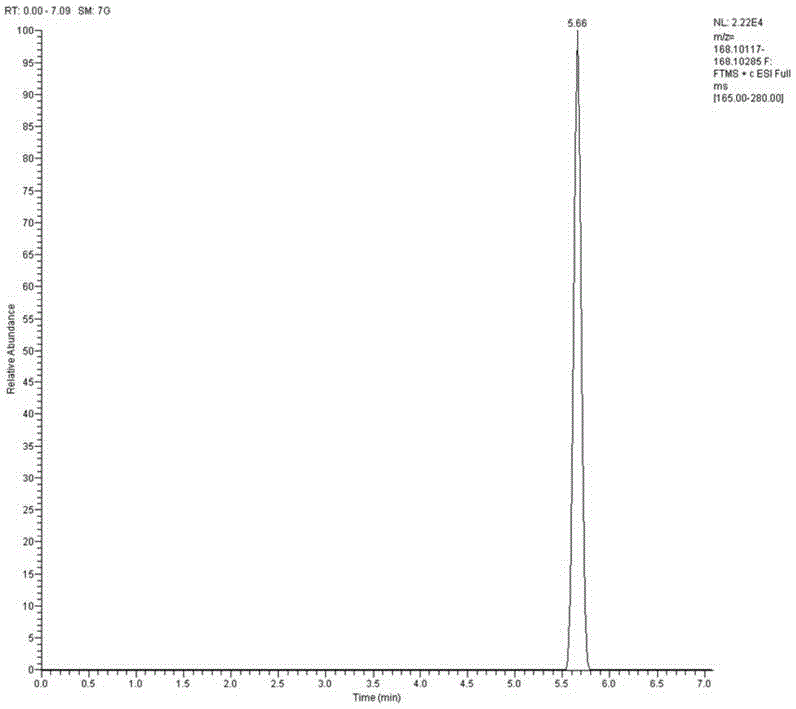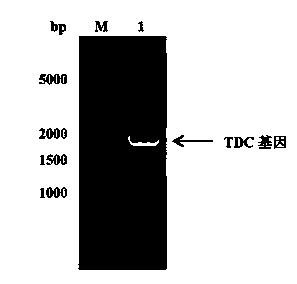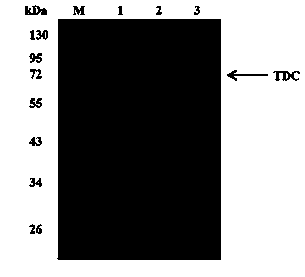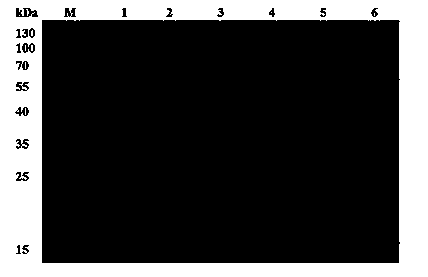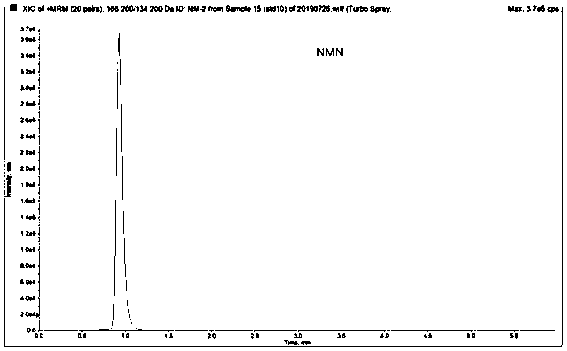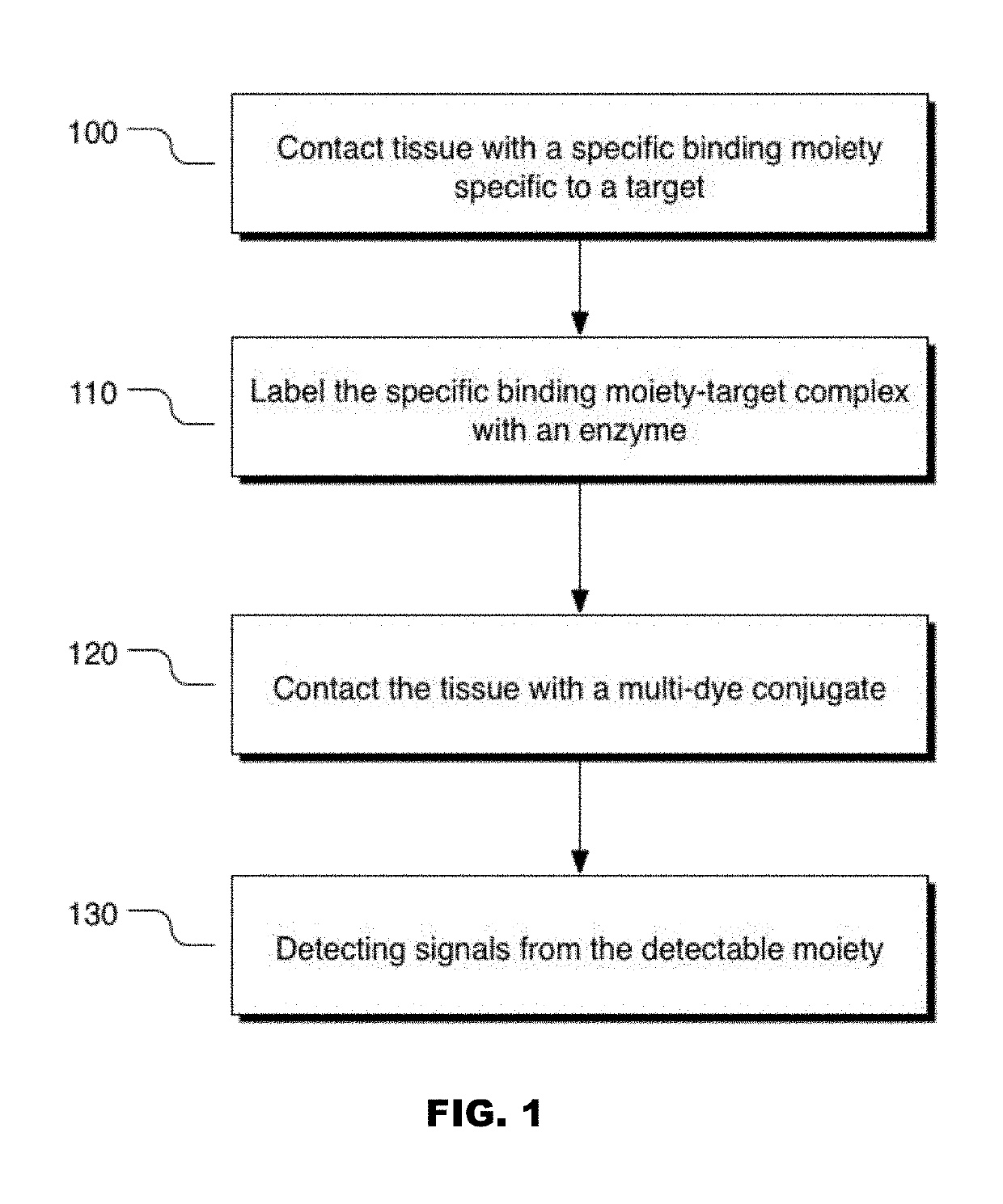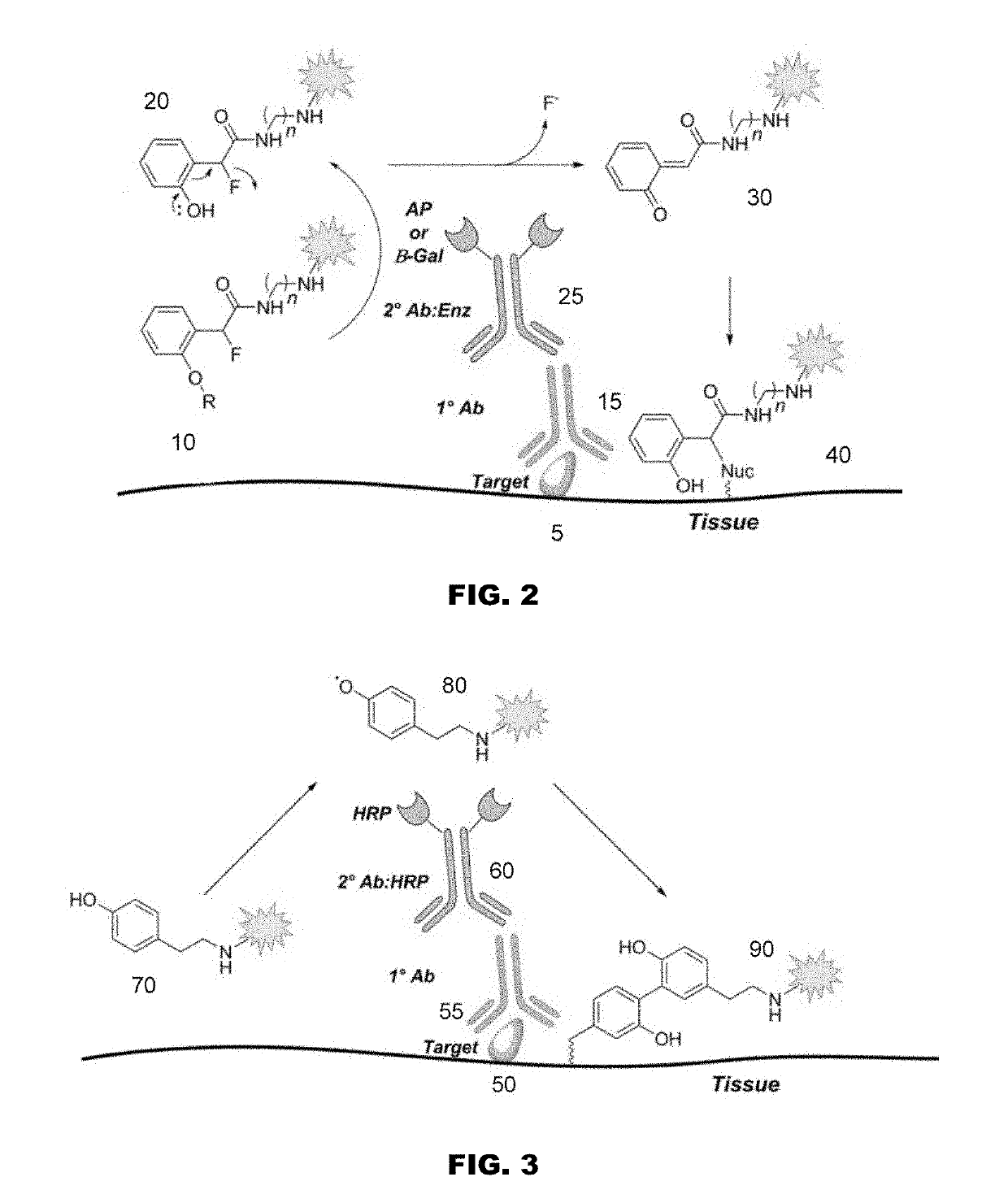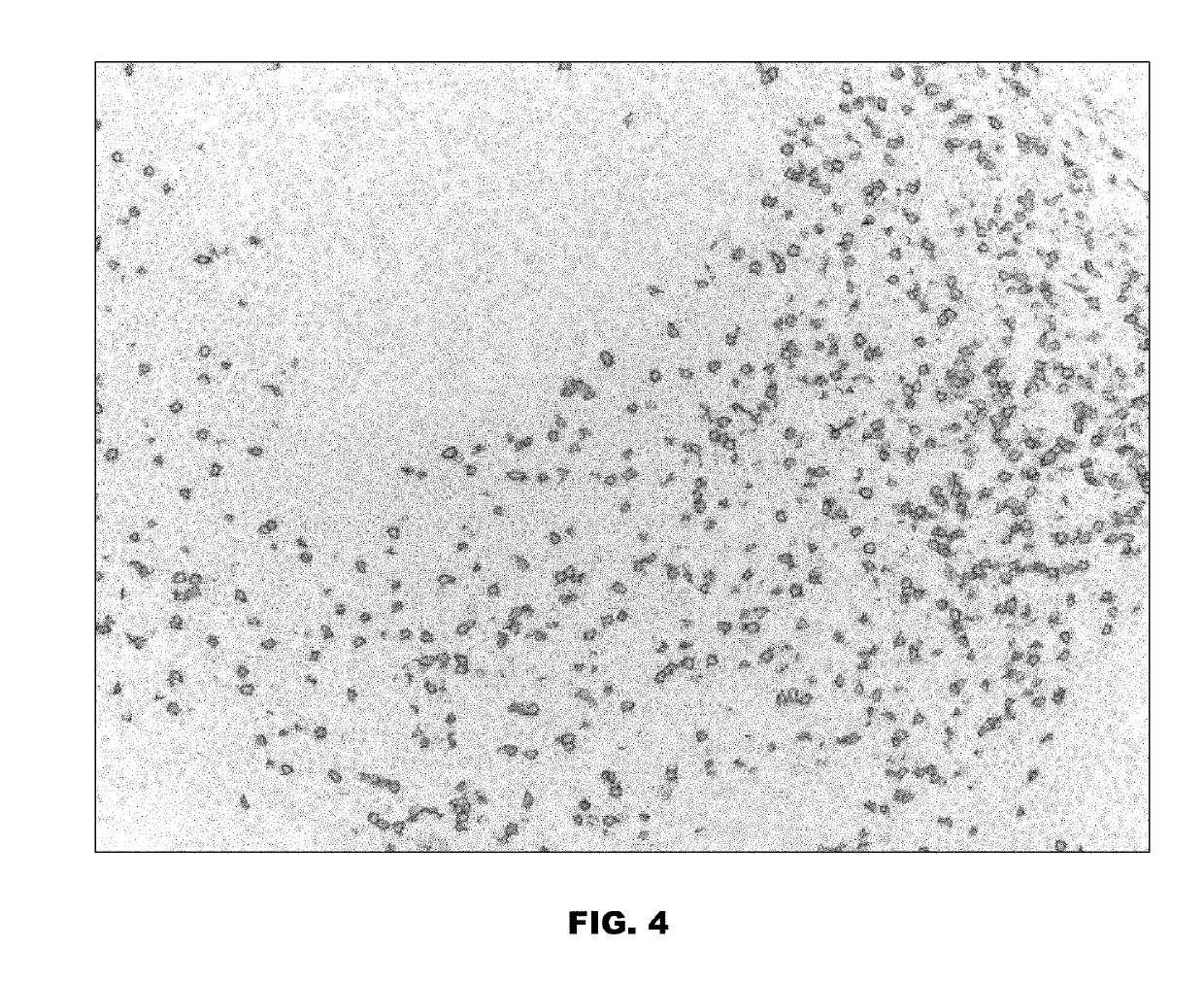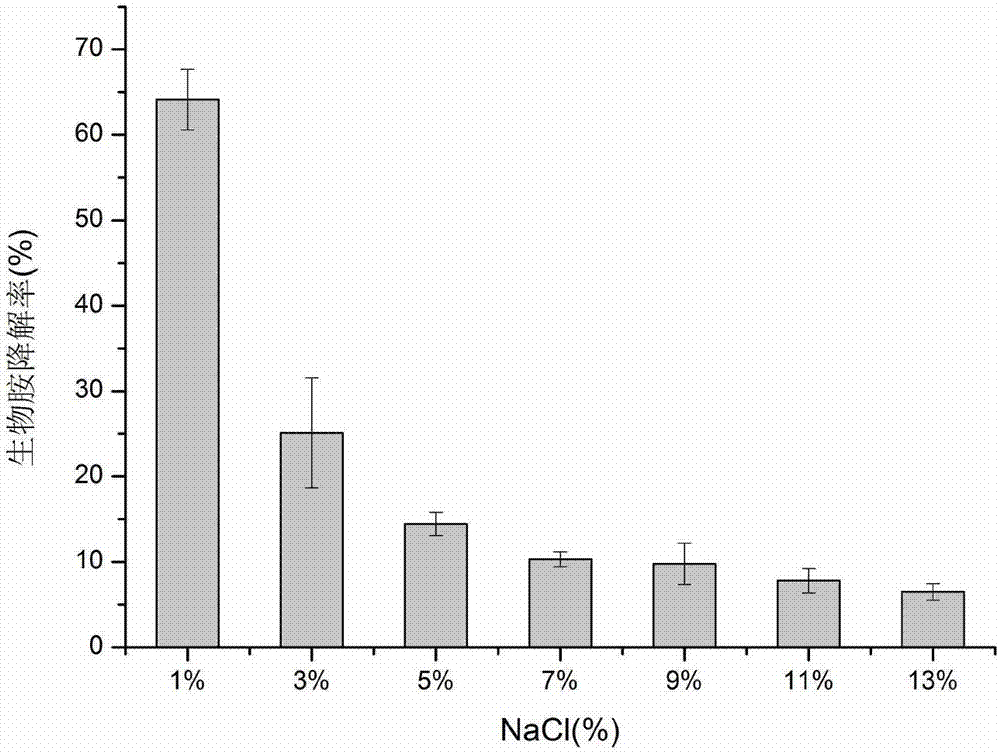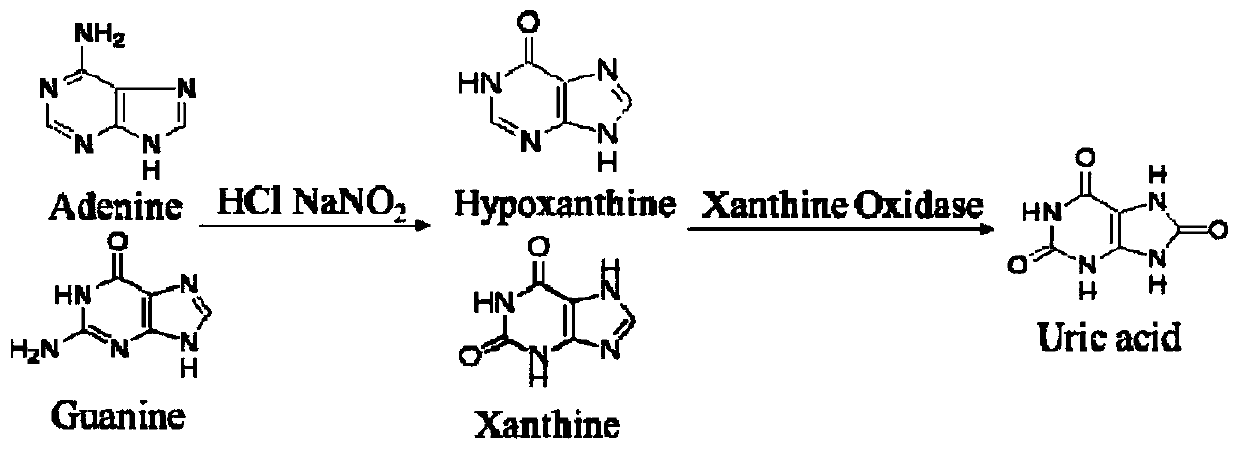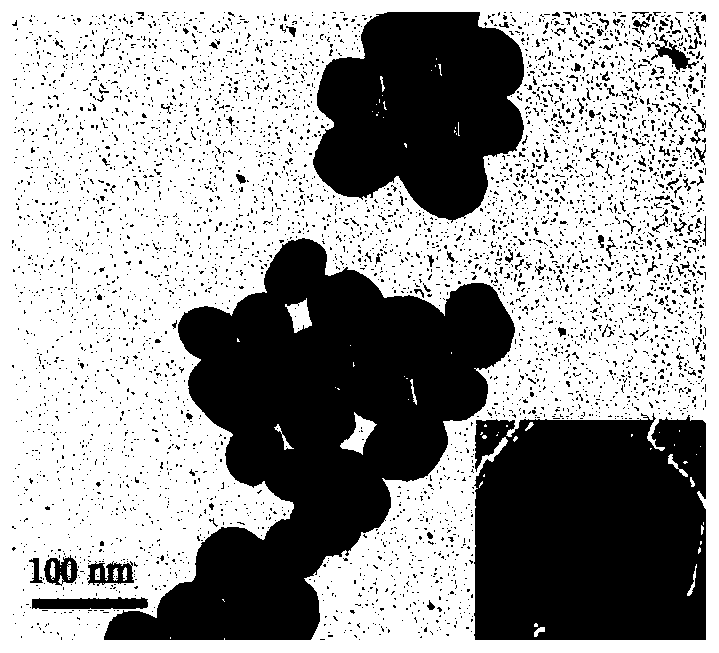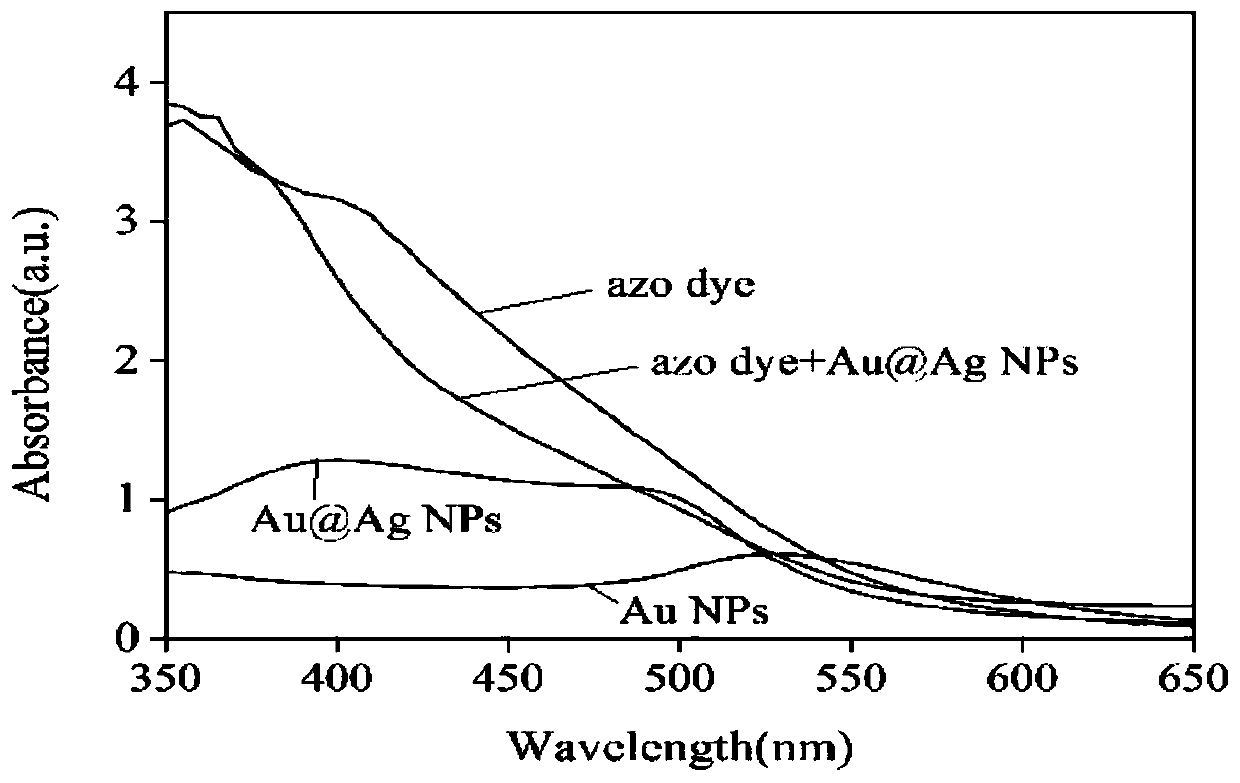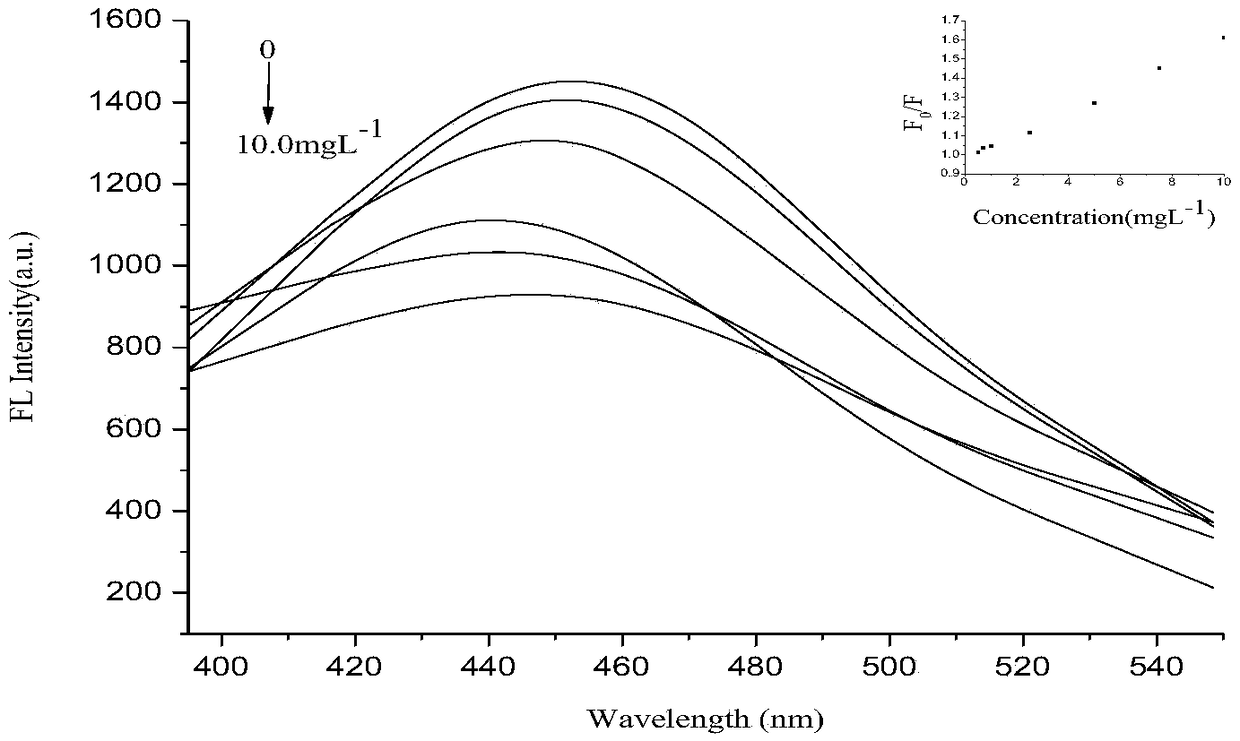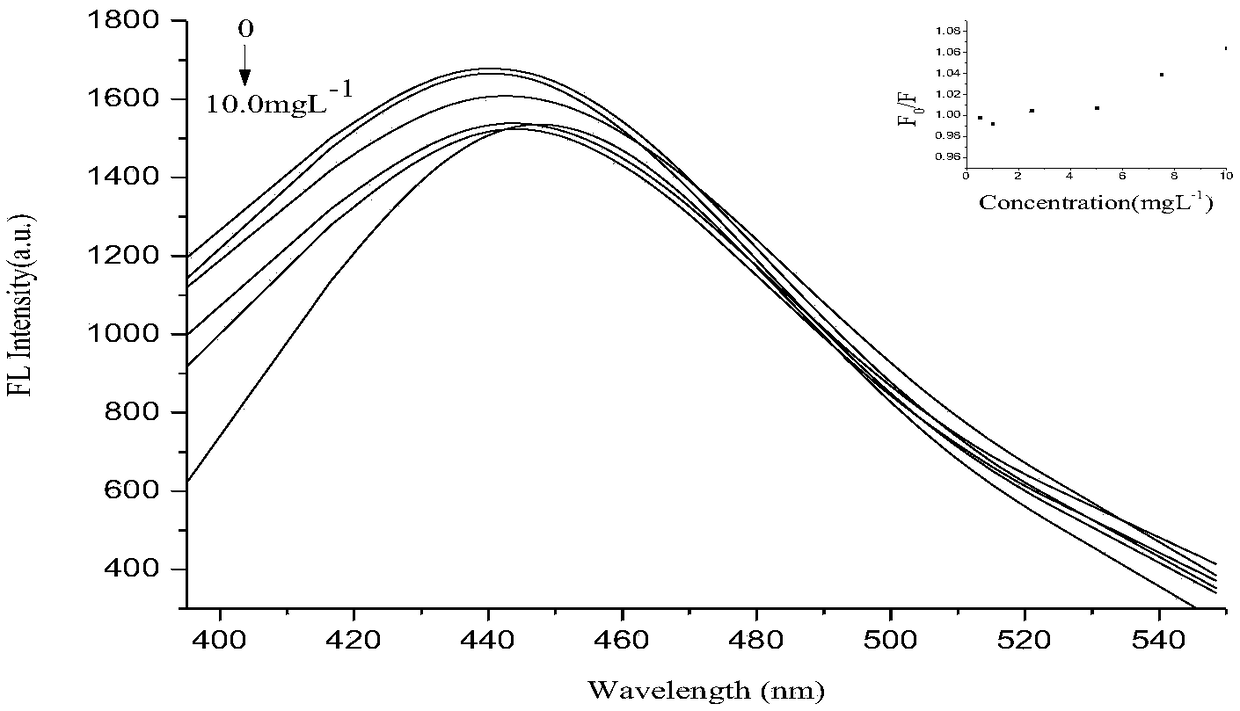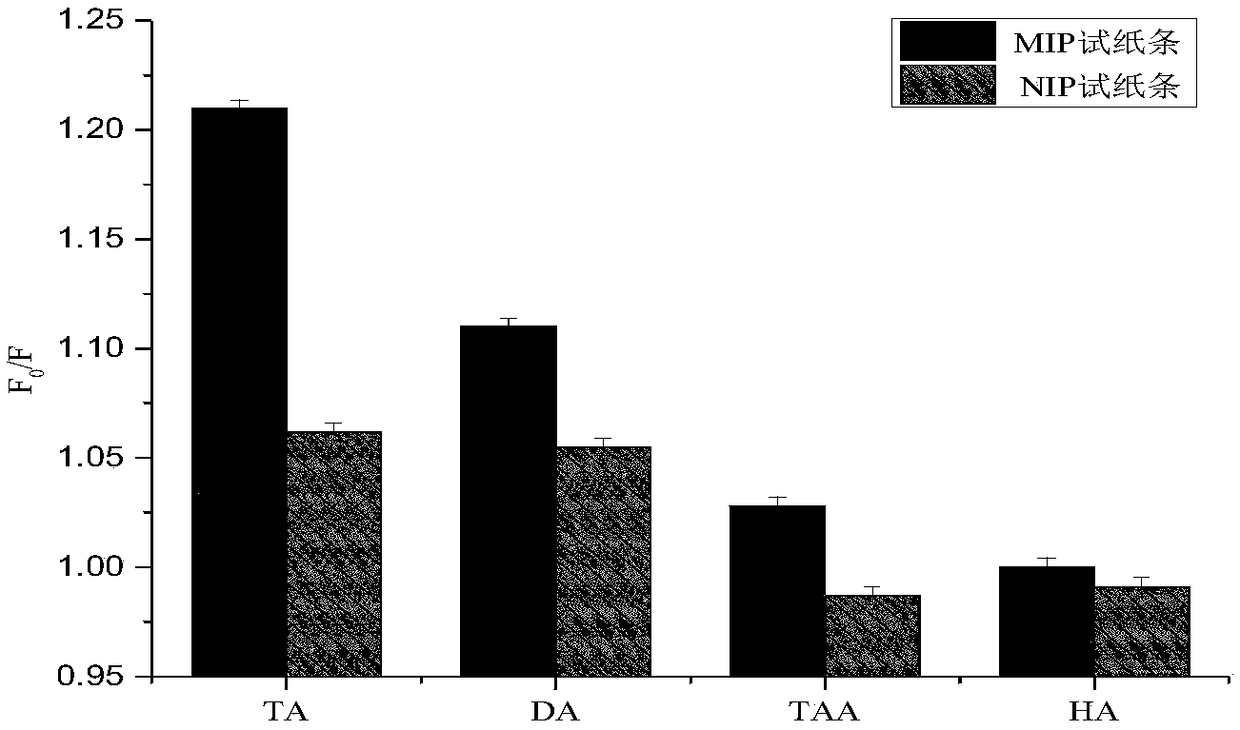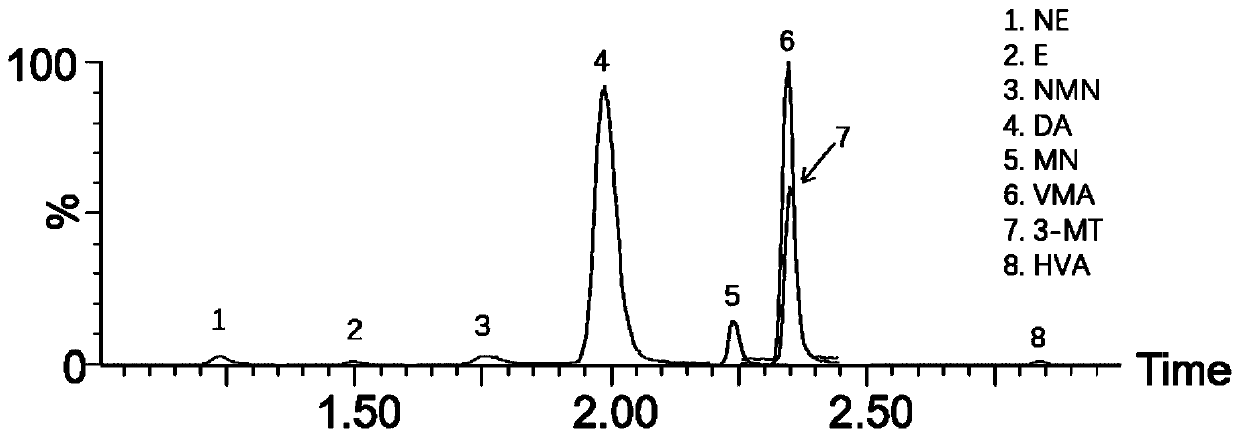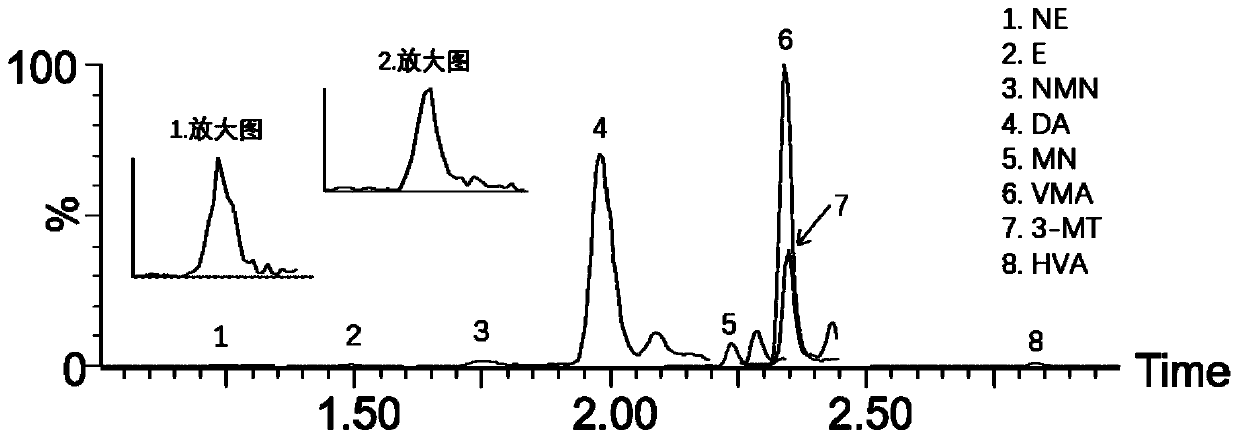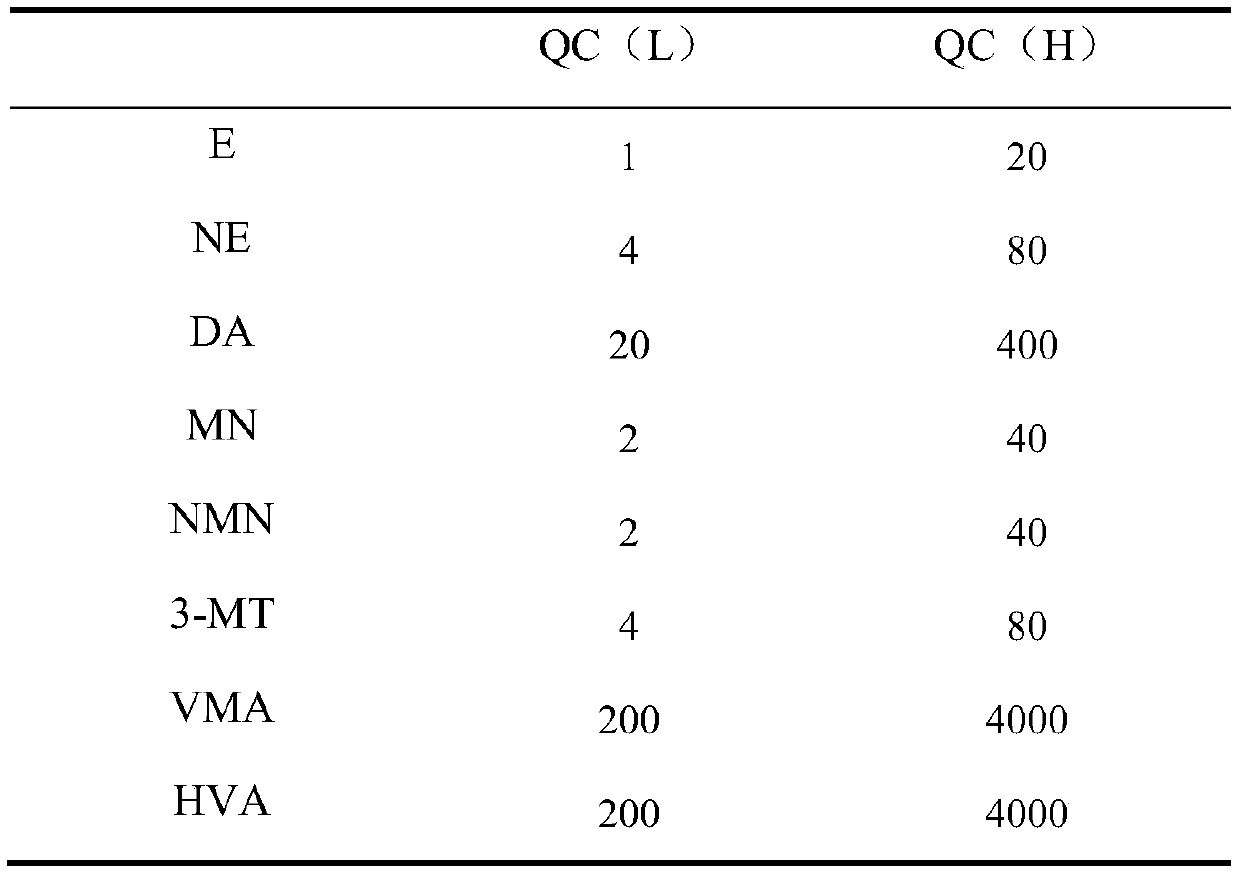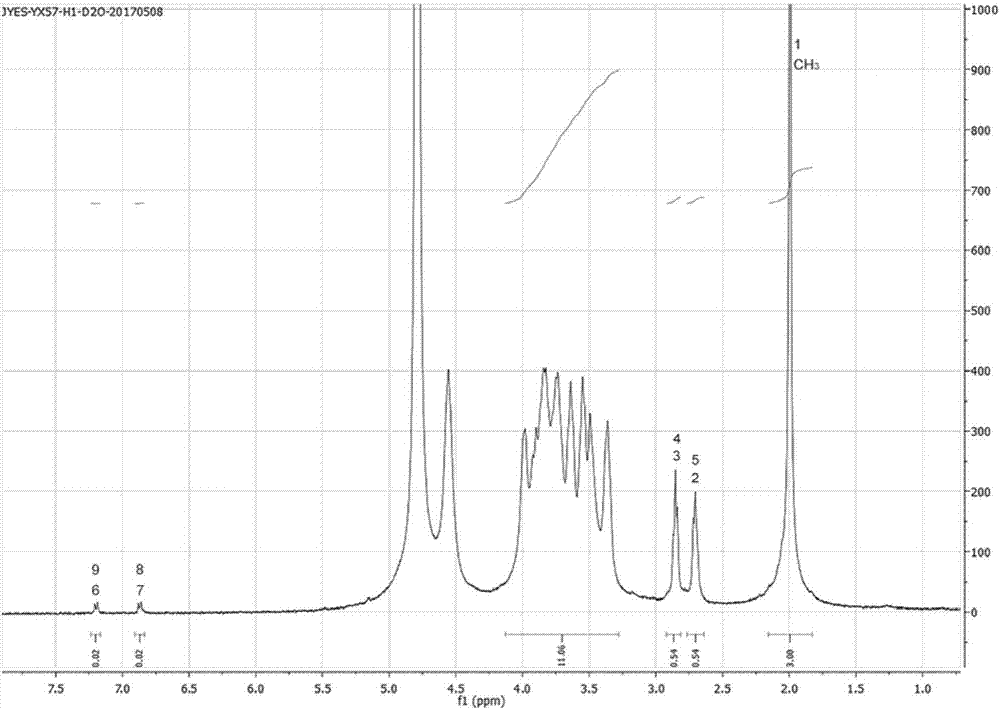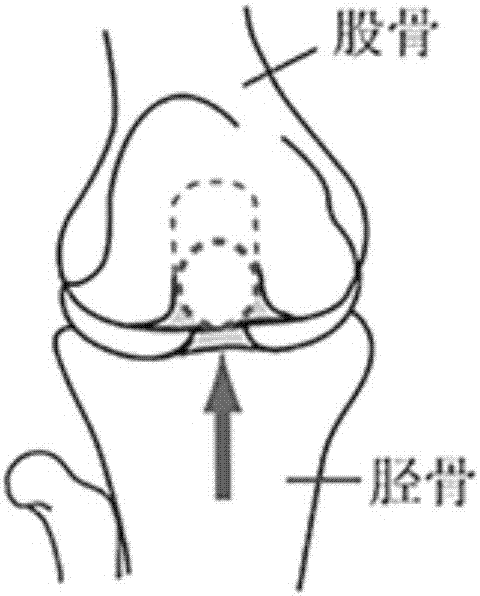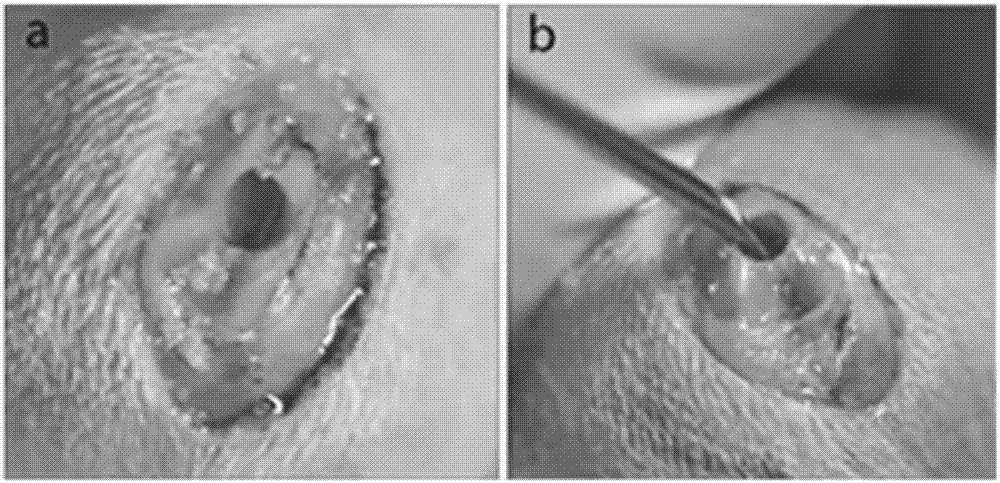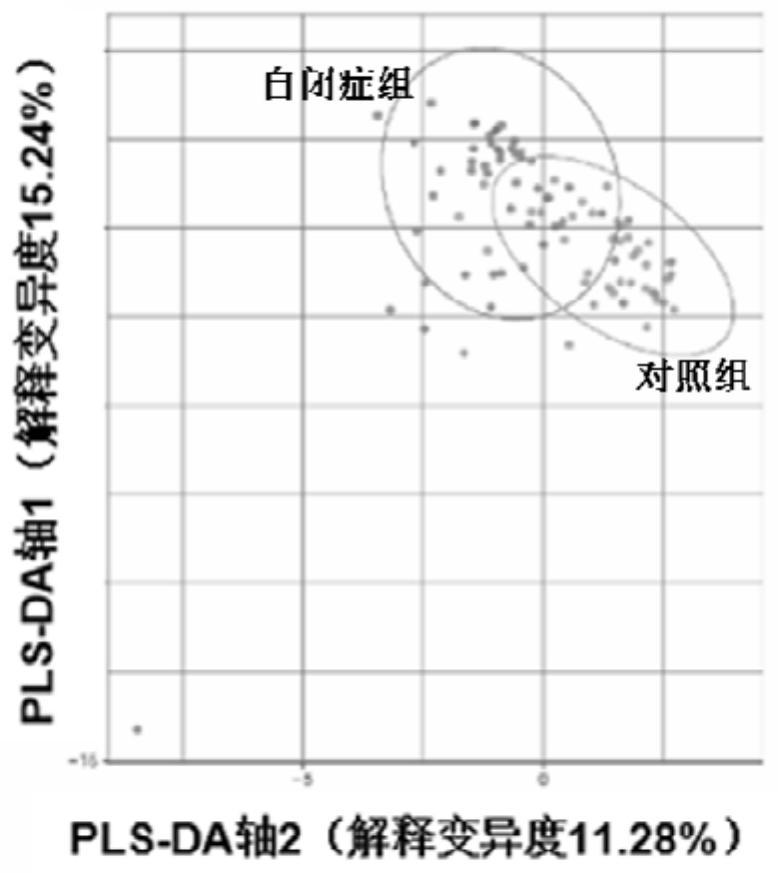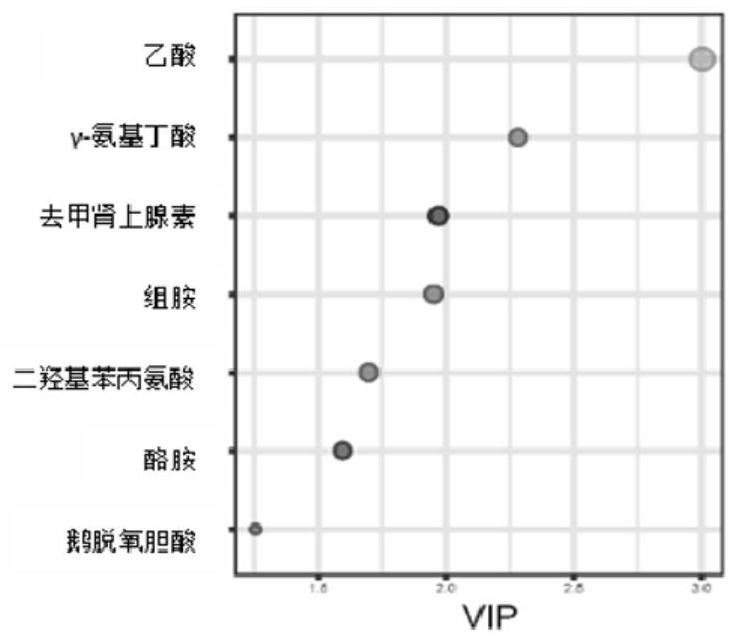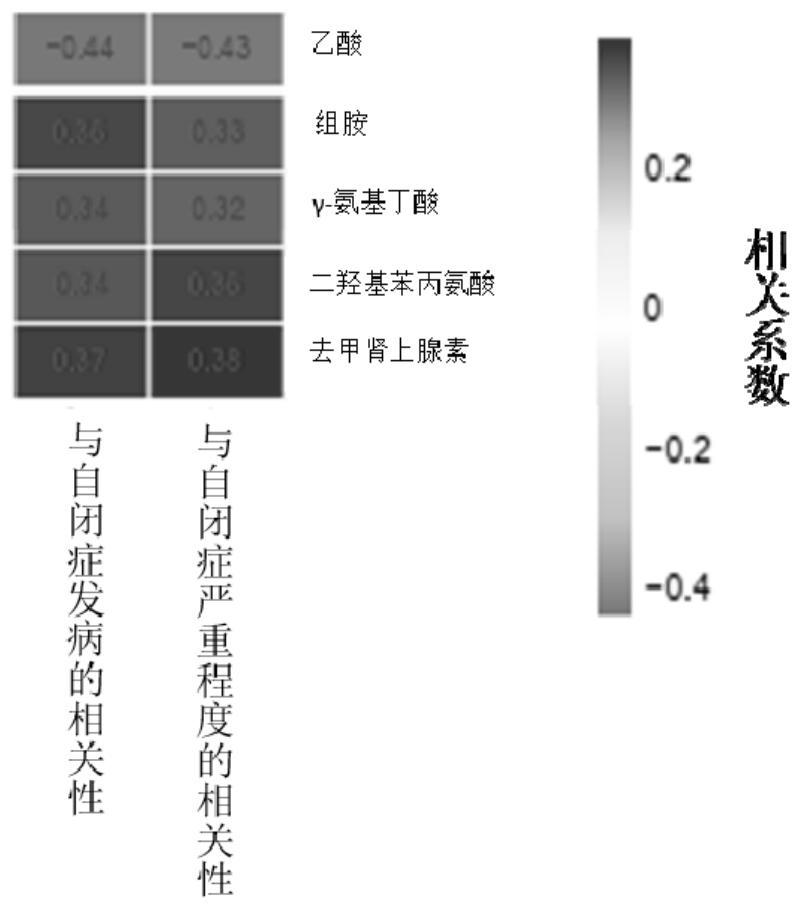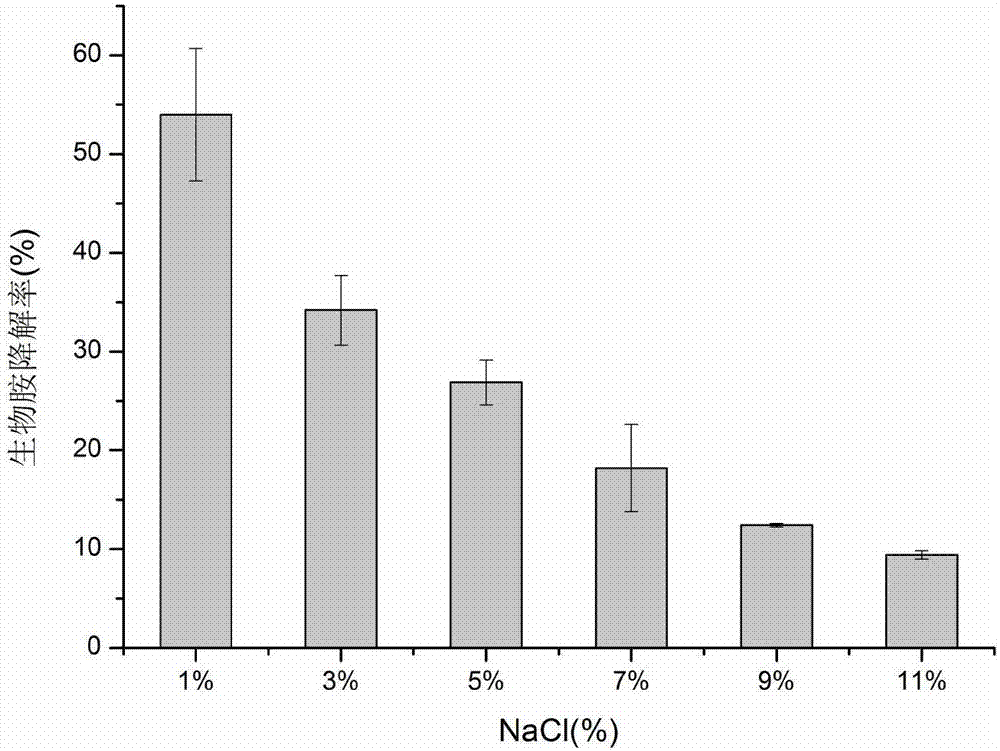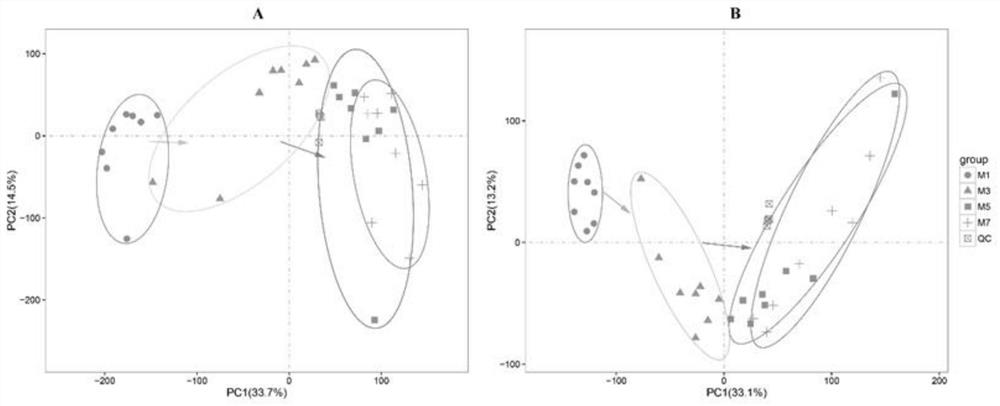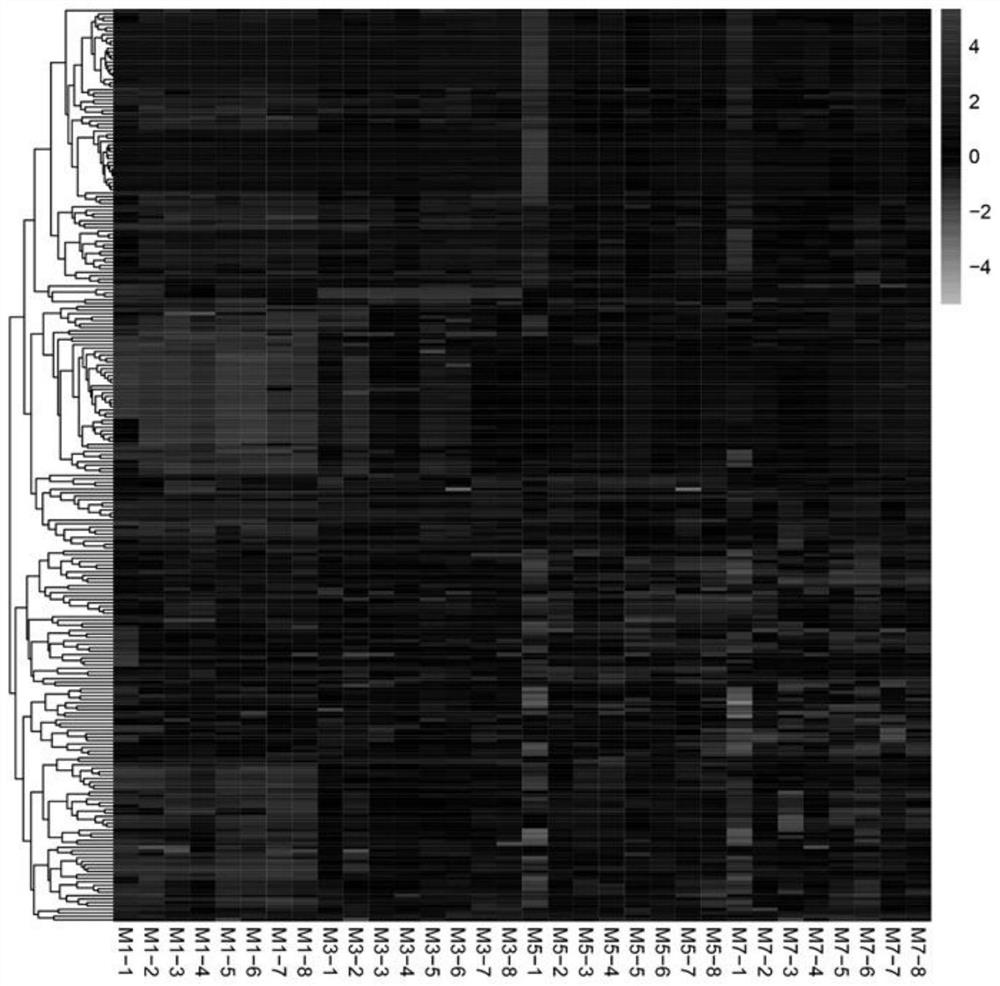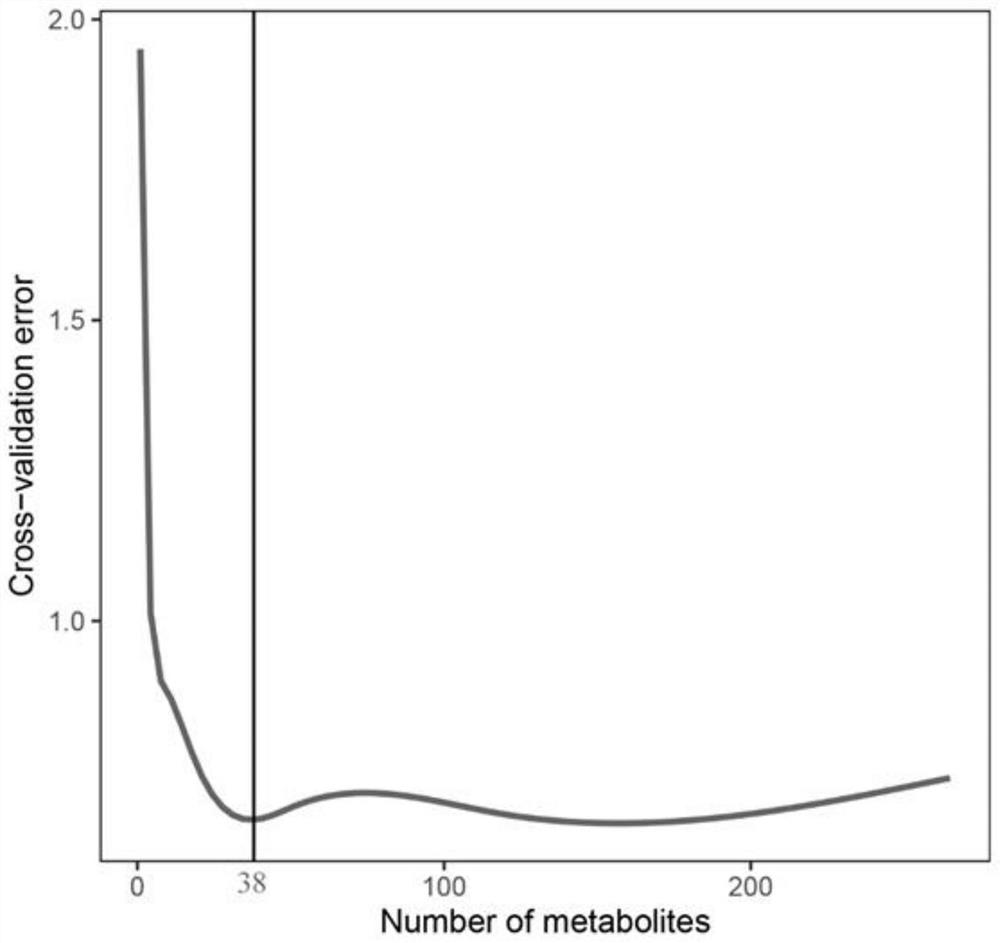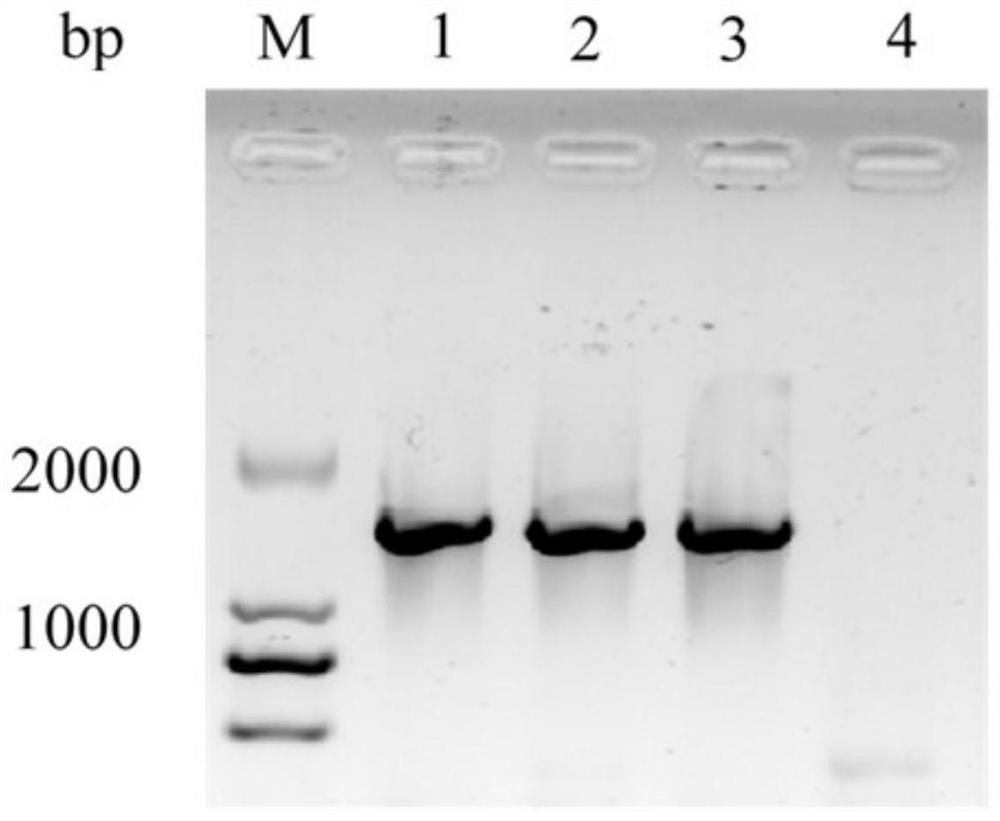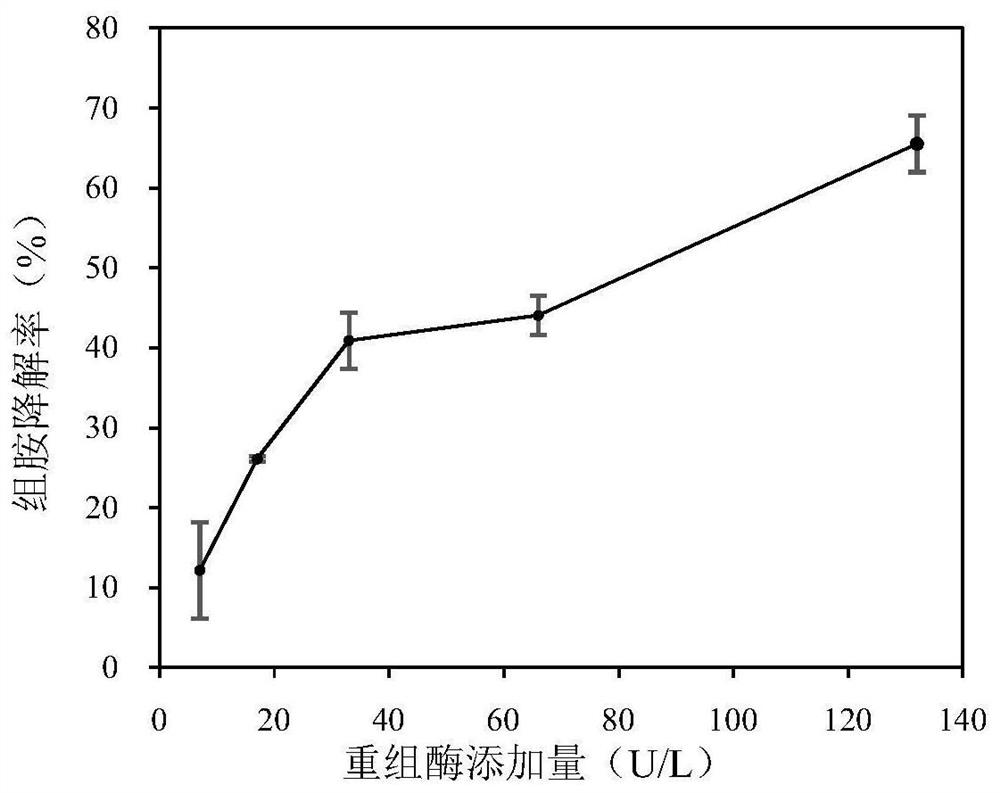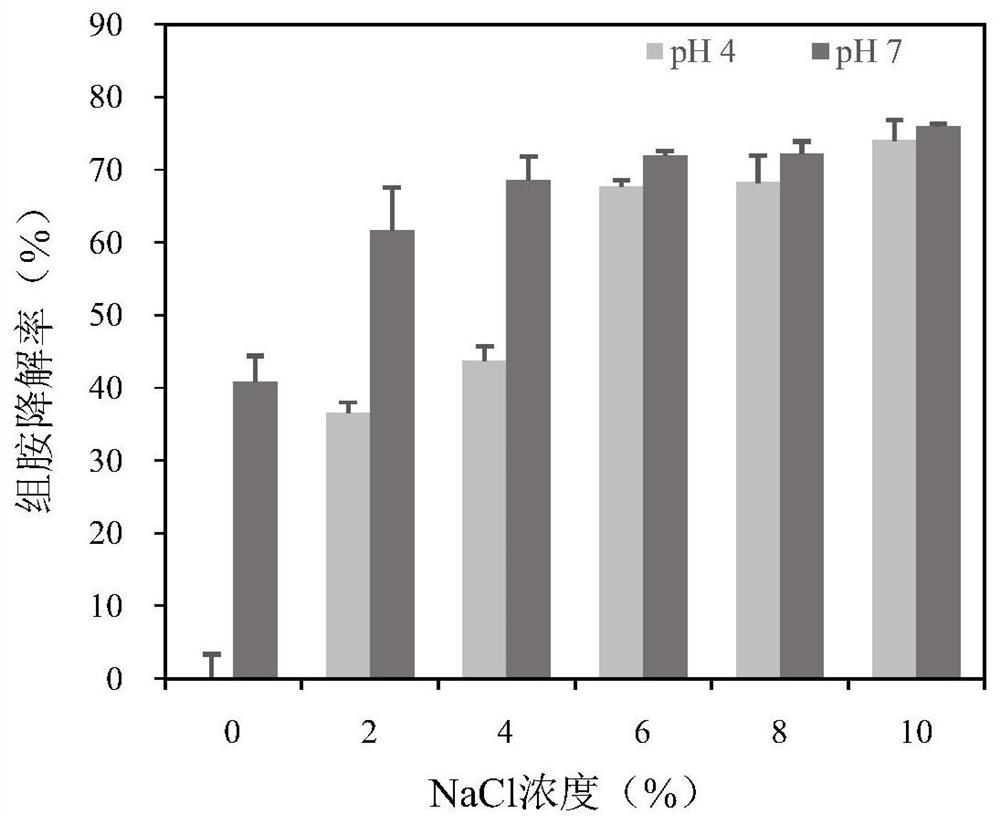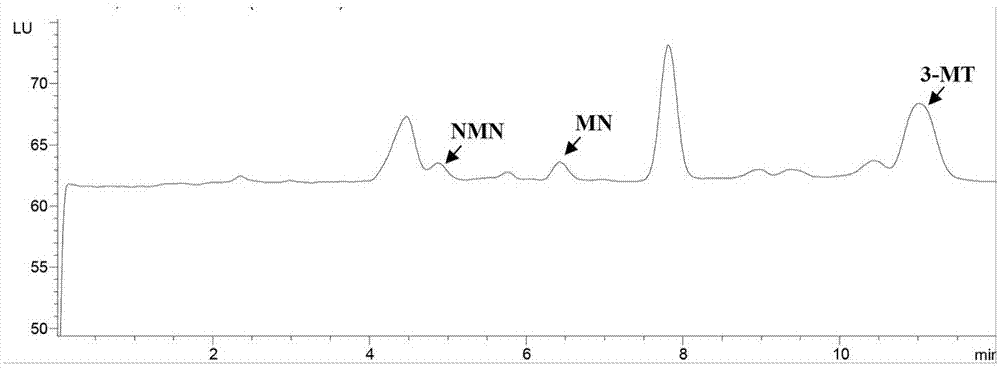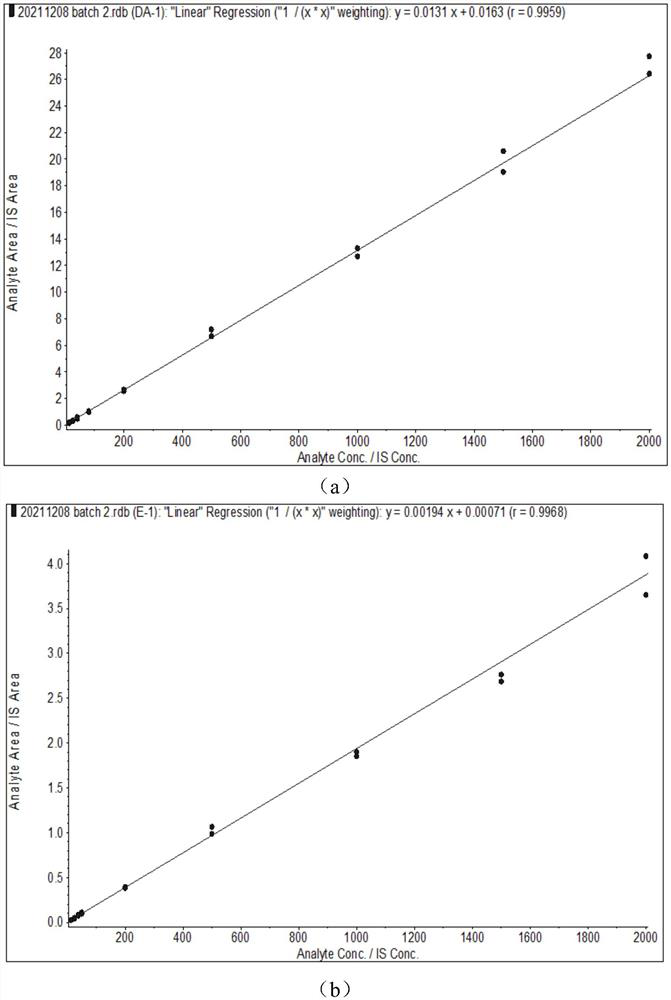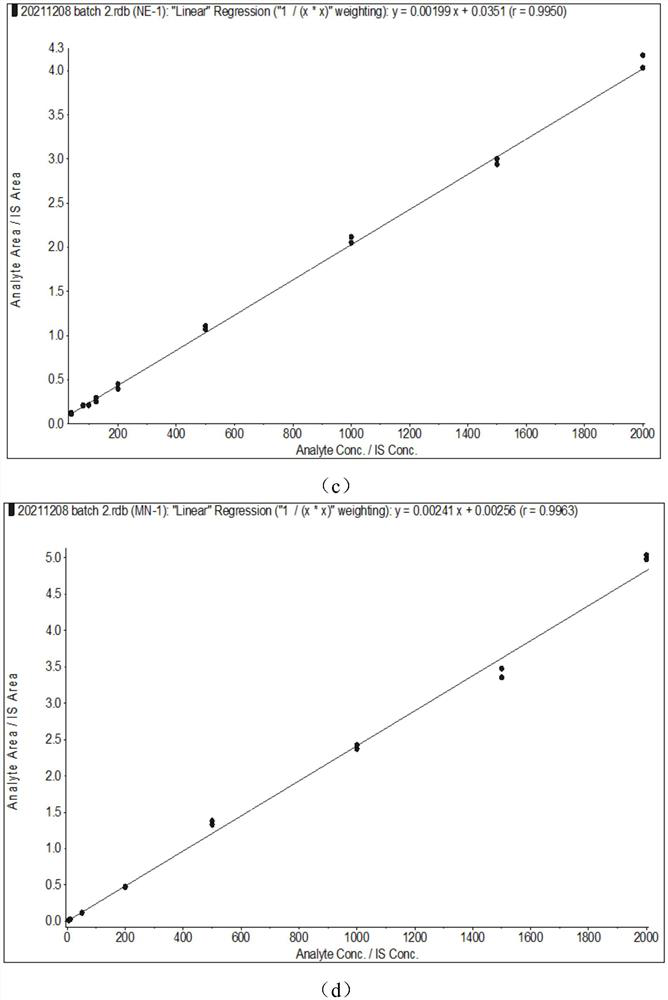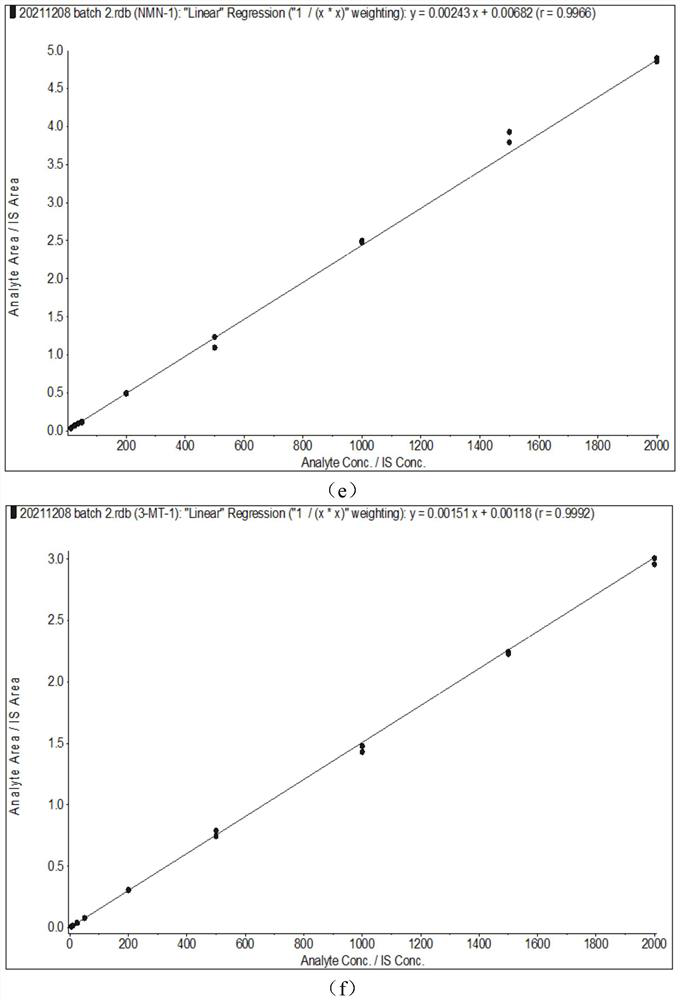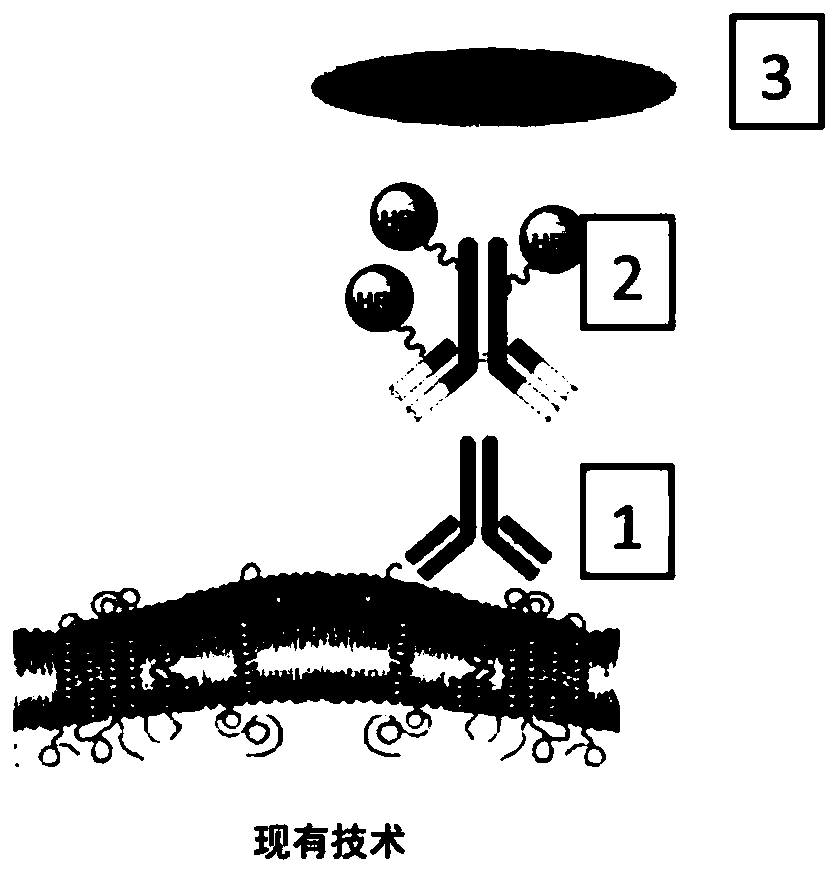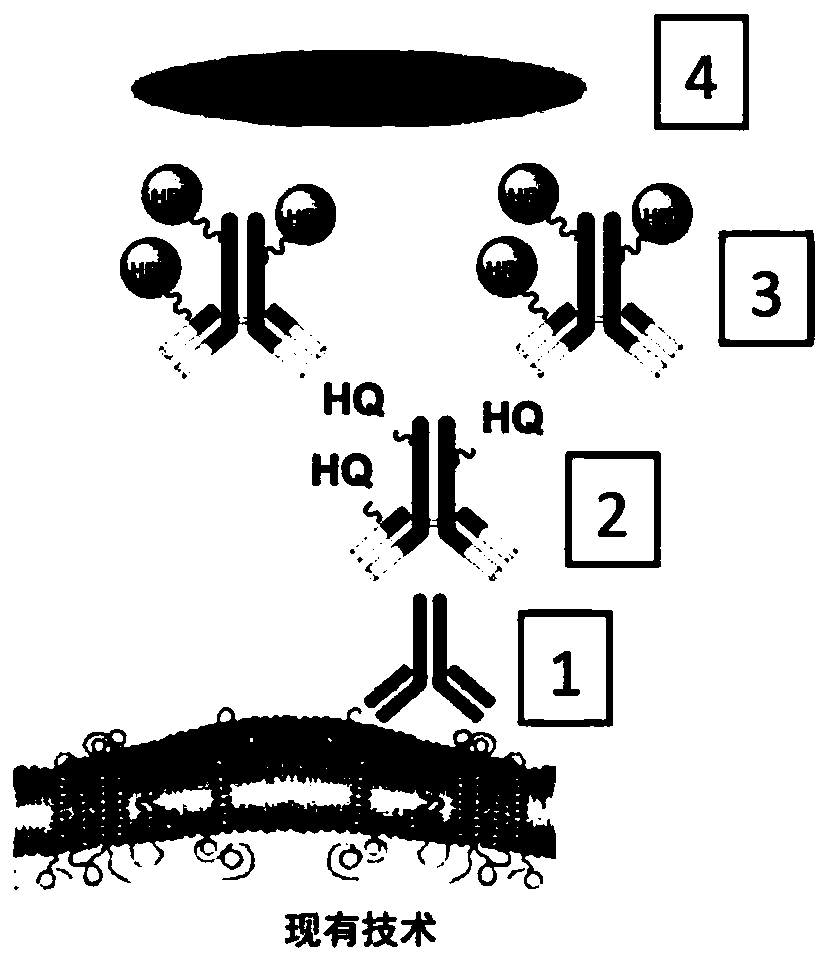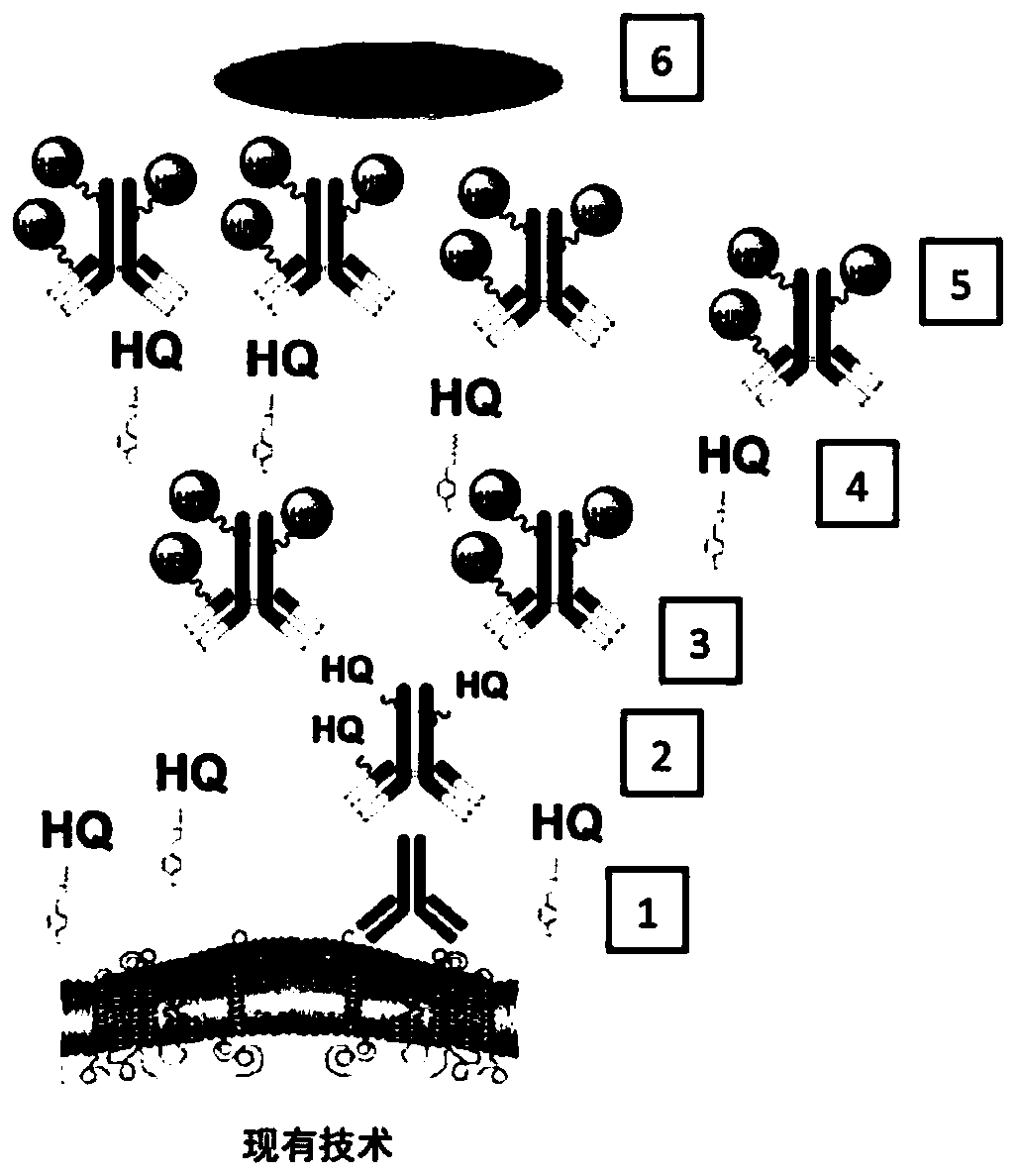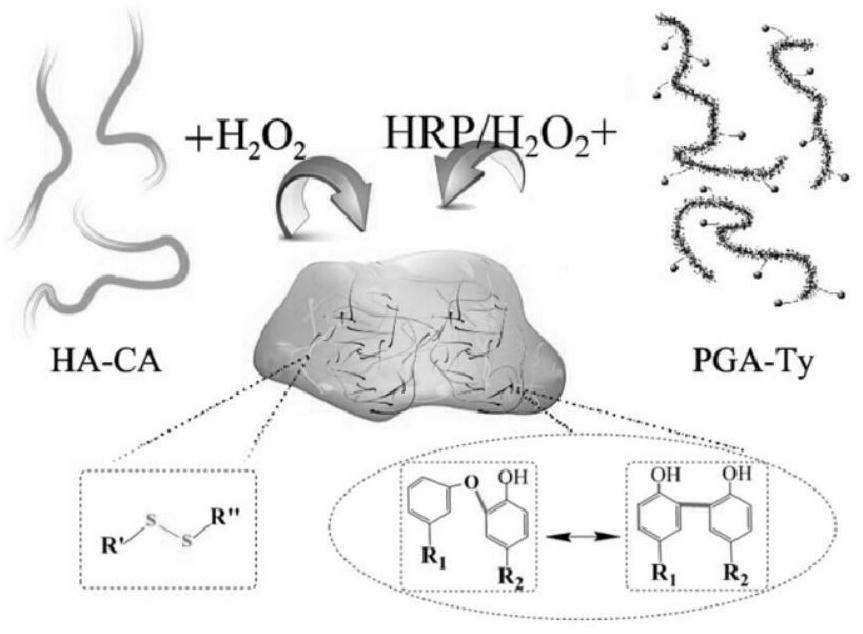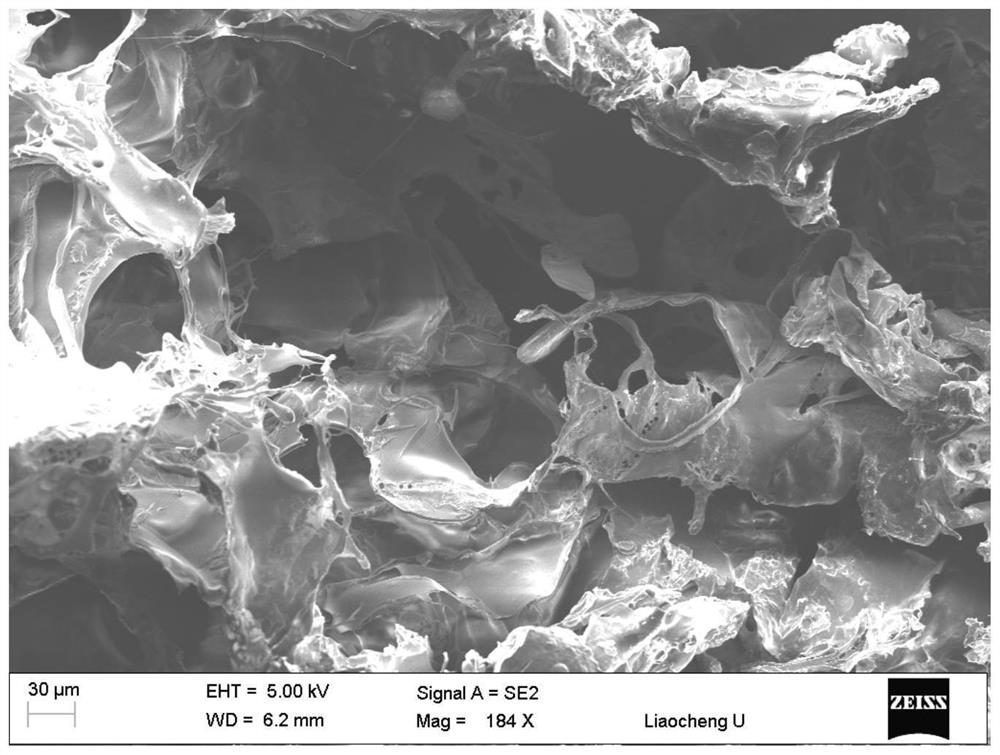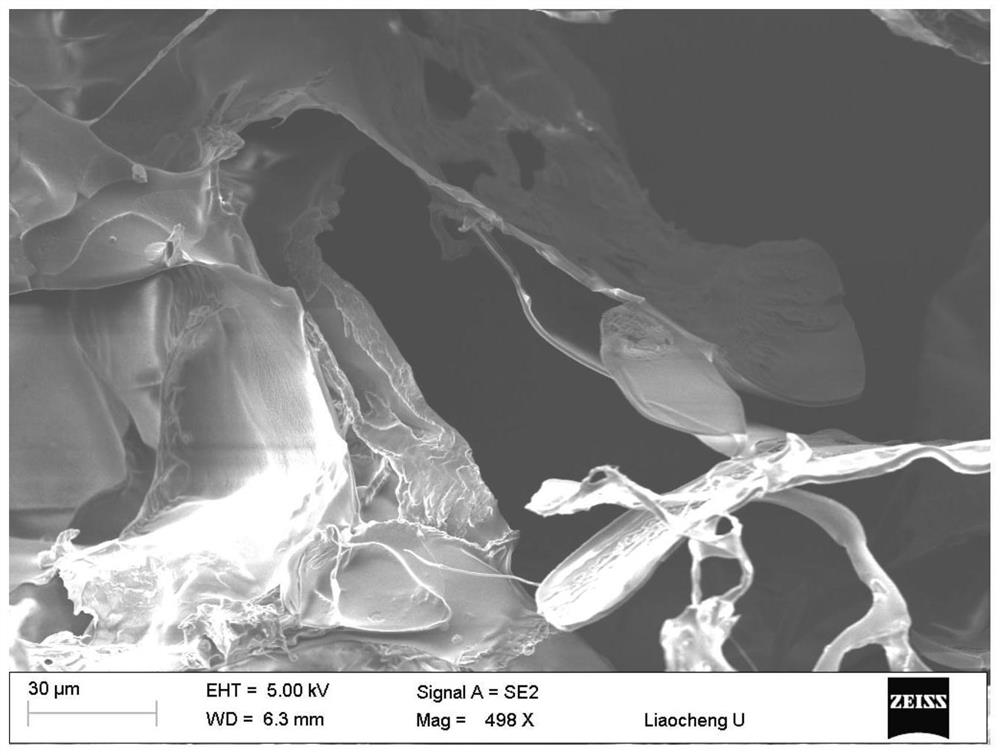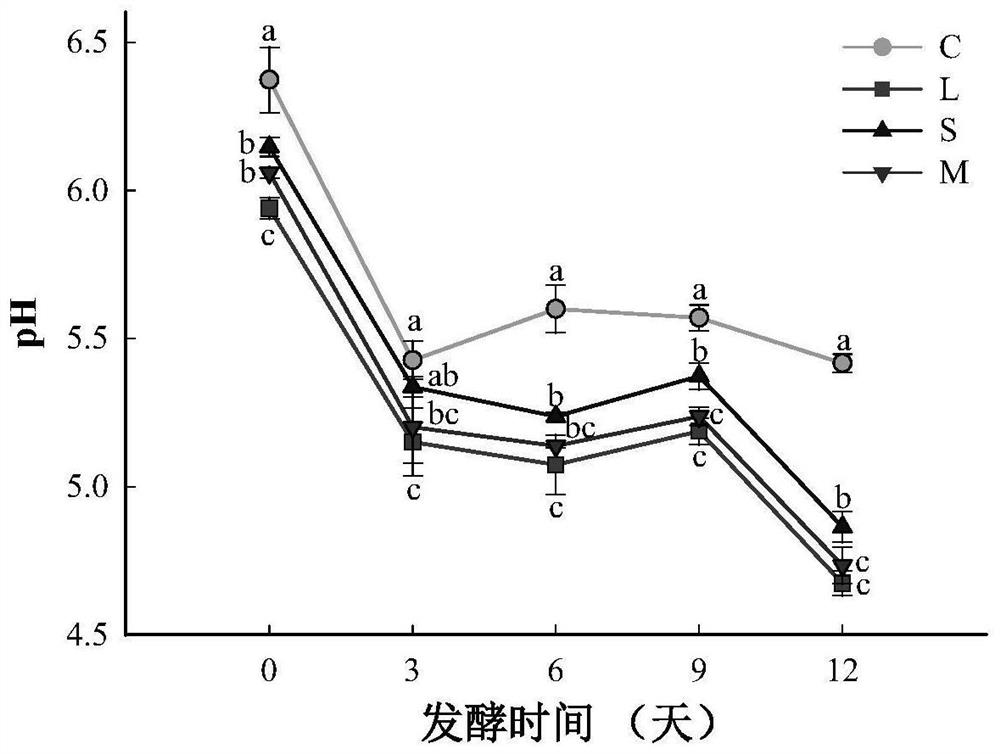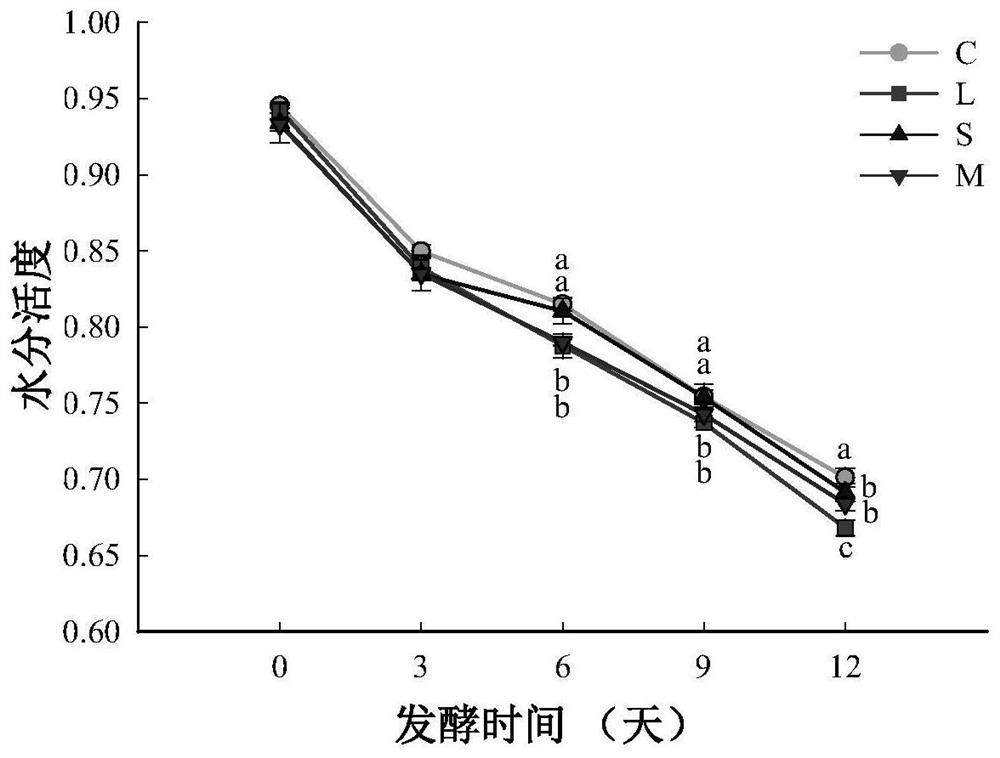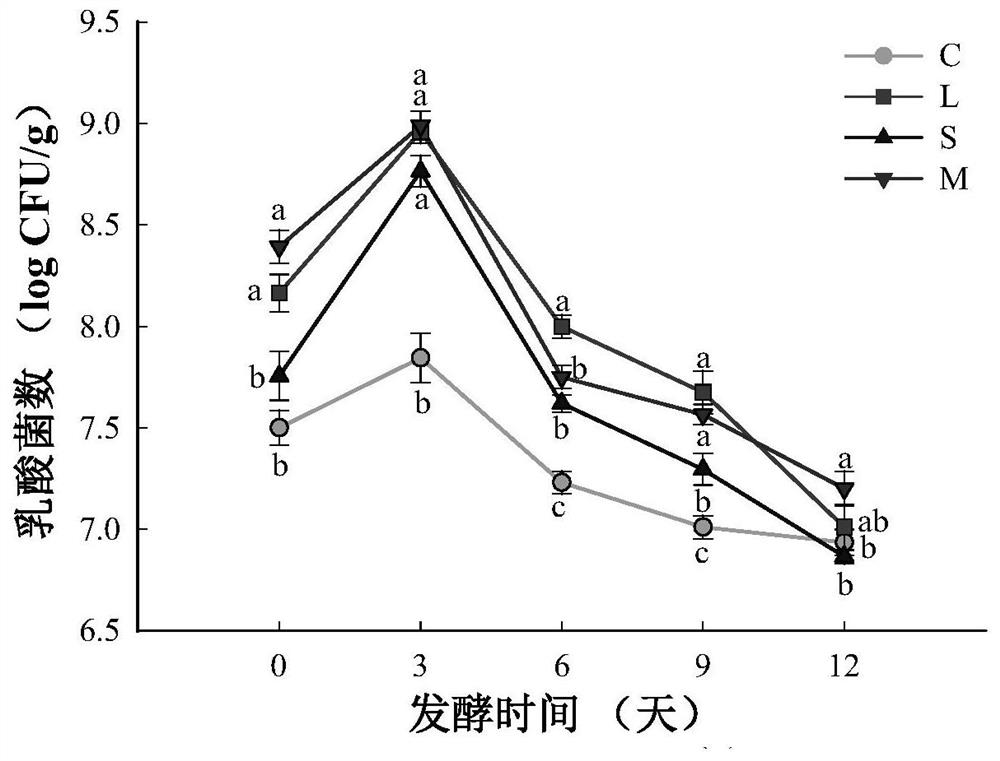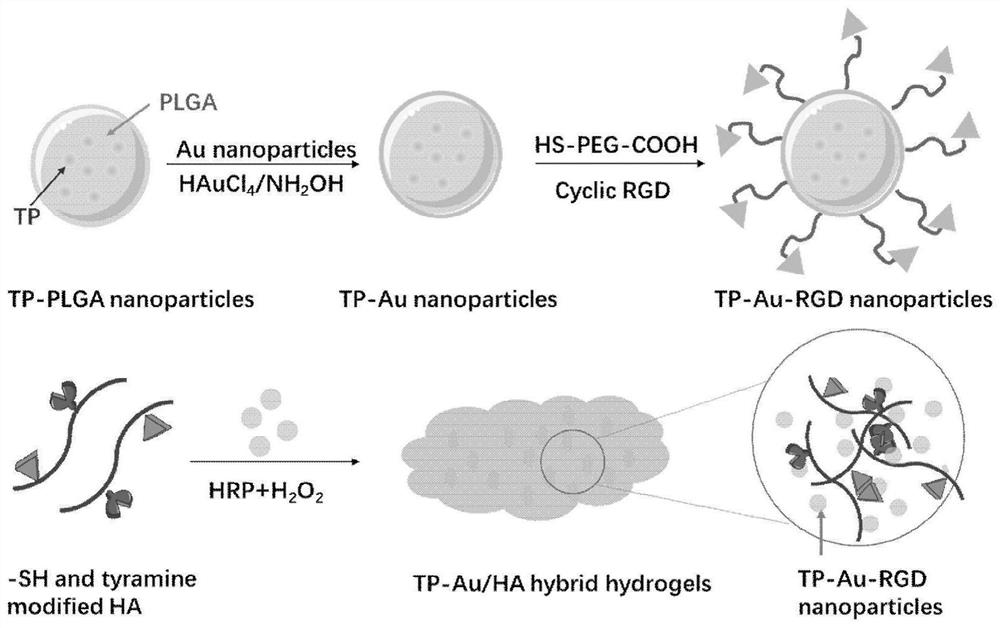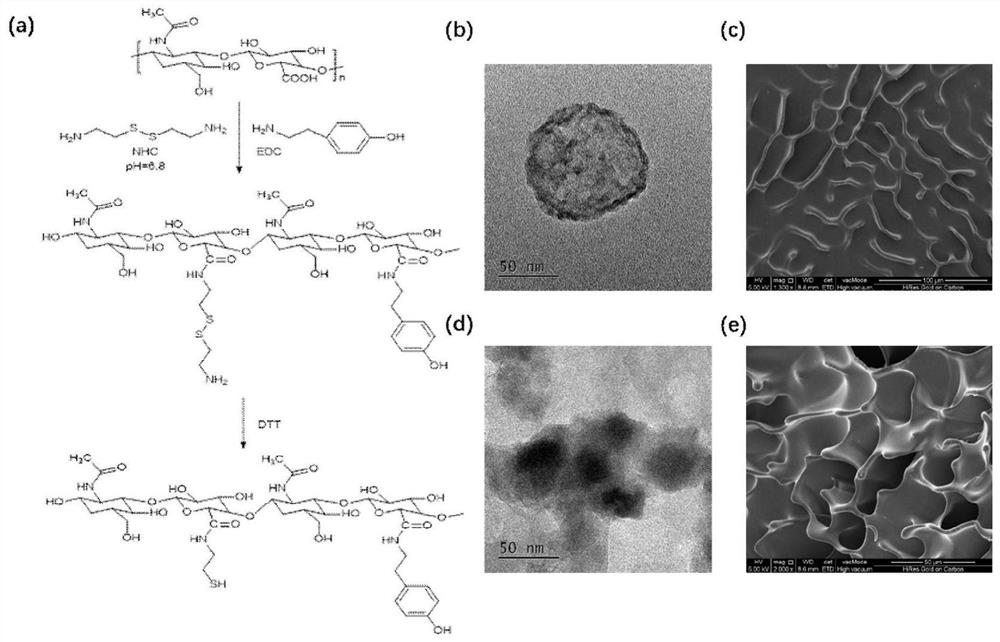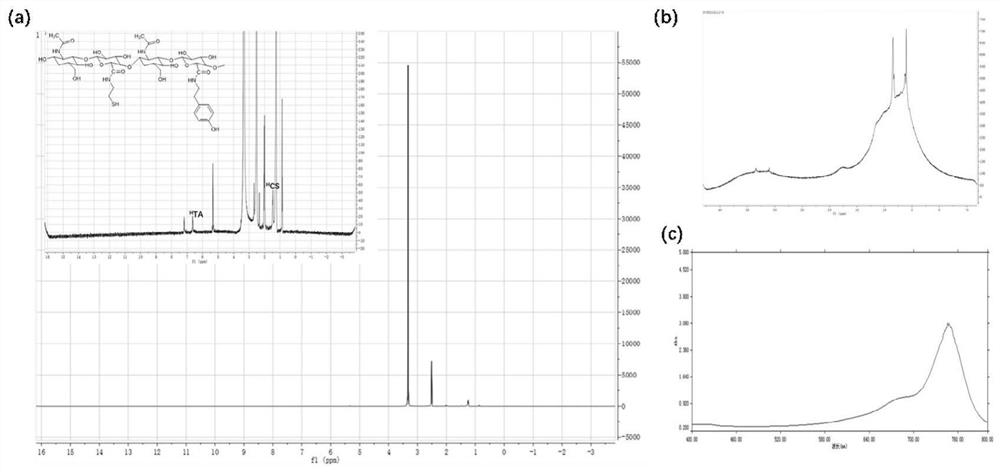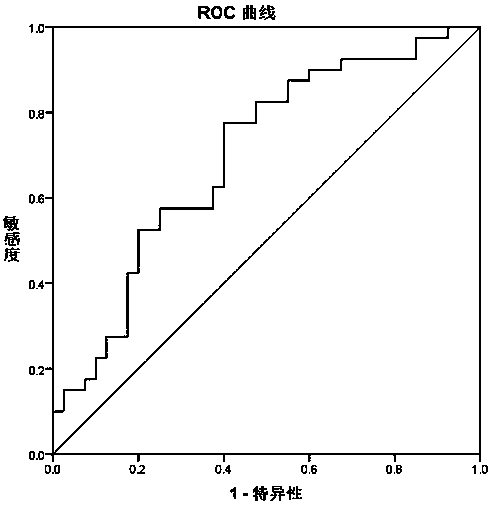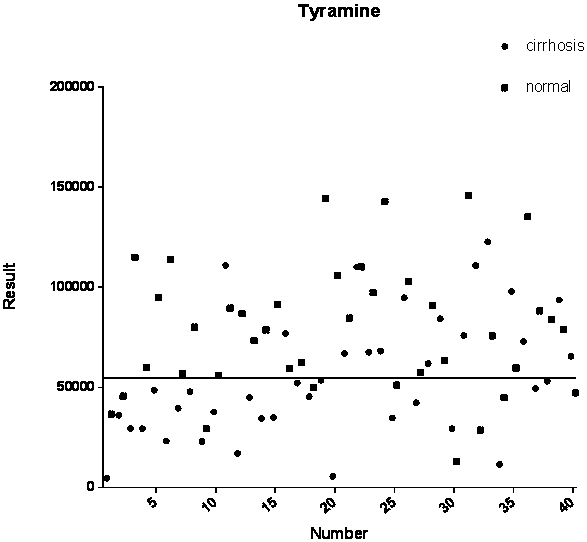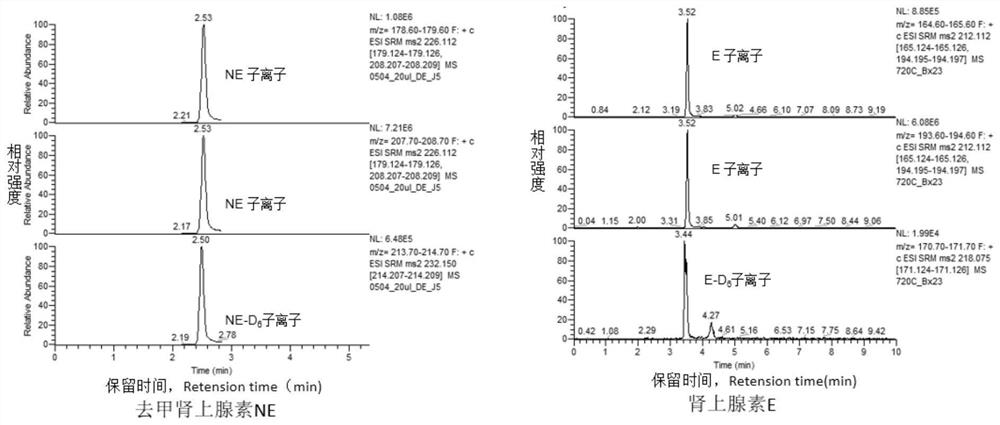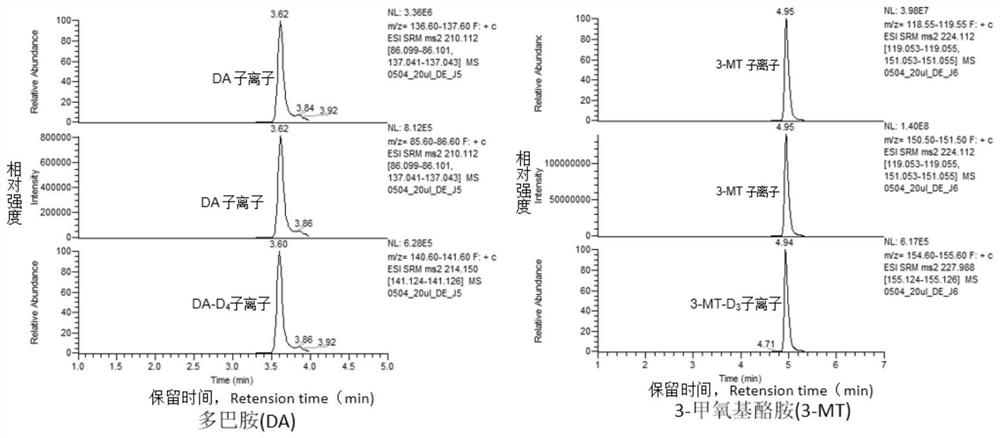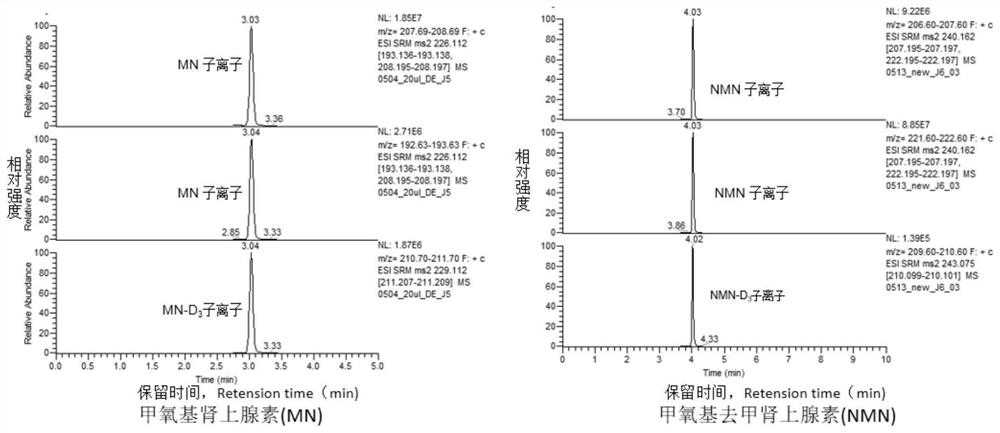Patents
Literature
101 results about "P-Tyramine" patented technology
Efficacy Topic
Property
Owner
Technical Advancement
Application Domain
Technology Topic
Technology Field Word
Patent Country/Region
Patent Type
Patent Status
Application Year
Inventor
Nanotechnology-based trace protein detection method
InactiveCN101943703AWide linear rangeLow detection limitColor/spectral properties measurementsBiological testingAntigenBiotin-streptavidin complex
The invention relates to a nanotechnology-based trace protein detection method, which combines enzyme-linked immunosorbent assay technology, tyramine signal amplification technology and the aggregation phenomenon of gold nanoparticles modified by different biological molecules, so an experimental method used for detecting trace proteins such as prostate specific antigen (PSA) and the like is established. The method comprises the following steps of: fixing an antibody aiming at the protein to be detected (such as the PSA) on the surface of a substrate; incubating another antibody with horseradish peroxidase (HRP) activity of the protein to be detected (such as the PSA) after capturing the protein to be detected in a sample, wherein the HRP catalyzes biotin-tyramide to generate biotin deposition under certain conditions; further amplifying a signal by using the aggregation phenomenon of the gold nanoparticles modified by biotin-labeled DNA and the gold nanoparticles modified by streptavidin; performing silver staining; and performing data analysis on an experimental result by using software. The method has the advantages of extremely low detection limit, wider detection range, capacity of detecting the antigen in a rabbit serum with complex compositions, and important application prospect.
Owner:CAPITAL UNIVERSITY OF MEDICAL SCIENCES
Mydrial derivates,preparation method of mydrial derivates and cosmetics or skin medicinal composition
The invention relates to a novel tyramine derivate and a method for preparing the compound. The invention also relates to a cosmetic or medical skin composition having the compound, as well as the application of the compound in the skin care field, in particular to the application in order to release the over-pigmentation.
Owner:SEDERMA SA
Piper hancei total alkaloid extract and uses thereof
The invention discloses a total alkaloids extractive of piper hancei and application thereof, belongs to the technical field of medicine, and in particular relates to a total alkaloids extractive of traditional Chinese medicine piper hancei and application thereof. The extractive is obtained from the traditional Chinese medicine piper hancei, and comprises the following alkaloid components: sinoacutine amide, hairy grama piperine, long pepper amide A, pepper a-amanitine, Guinea pepper, piperine, piperettine, piperovatine, N-p-tonka-bean acyl tyramine, N-trans- asafetida acyl tyramine, birthwort lactam AIIIa, birthwort lactam II, and 2E, 4E-N- isobutyl-7-3,4-methinedioxy phenyl-2, 4-diene heptamide, long pepper nerinine and a derivate thereof, wherein the total content of the total alkaloids components is counted by 5 to 100 percent by weight.
Owner:JIANGXI HERBFINE HI TECH
Method for utilizing ultra-effective bonded phase chromatography to serially connect QDa while quickly detecting seven biogenic amines in white spirit
ActiveCN105866302AEasy to useEasy to operateComponent separationTesting beveragesBiogenic amineChromatography column
The invention discloses a method for utilizing an ultra-effective bonded phase chromatography to serially connect QDa while quickly detecting seven biogenic amines in white spirit and belongs to the technical field of detection. The method is characterized by the following steps: after extracting a to-be-detected wine sample with acetonitrile, taking BEH C18 bonded phase chromatographic column as a separating column and carbon dioxide (A)+ isopropanol (B) as flowing phase for performing gradient eluting, and adopting a QDa mass spectrometry detector for detecting after separating the sample through the ultra-effective bonded phase chromatography (UPC2). The method provided by the invention is simple, quick, accurate, reliable and applicable to the simultaneous detection for the contents of seven biogenic amines (histamine, putrescine, cadaverine, phenylethylamine, spermidine, tyramine and octopamine) in white spirit.
Owner:ANHUI GUJING DISTILLERY +1
Methods for detecting an analyte of interest using catalyzed reporter deposition of tyramide
InactiveUS20050003462A1Improving catalyzed reporter deposition stainingIncreasing signal can be detectedPreparing sample for investigationBiological testingTarget analysisAnalyte
The present invention relates to methods of staining cells for flow cytometry, using catalyzed reporter deposition and amplification staining. A catalyzed reporter deposition or an analyte dependent enzyme activation system is described for detecting and / or quantitating an analyte of interest in a cell by flow cytometry. Also described are compositions for use in catalyzed reporter deposition methods that can be used to reduce background staining, and thereby enhance peak signal separation between histograms obtained from cells stained with control immunoglobulin versus cells stained with immunoglobulin specific for an analyte of interest, in catalyzed deposition methods.
Owner:VERVE
Application of lactobacillus plantarum in degradation of biogenic amines in wine making
ActiveCN104388329AGood winemaking adaptabilityImprove conversion rateBacteriaMicroorganism based processesBiotechnologyGrape wine
Belonging to the field of biotechnology and fermentation, the invention discloses a method for degradation of biogenic amines in wine making by lactobacillus plantarum. The strain is obtained by screening the surfaces of wine grapes, not only can effectively reduce the content of biogenic amines in an MRS medium added with putrescine, histamine and tyramine, but also can be directly applied in the wine making process. With good high acid and high alcohol content and high SO2 tolerance, and very high malic acid-lactic acid conversion rate, the strain can effectively decrease the content of biogenic amines in the wine making process.
Owner:CHINA NAT RES INST OF FOOD & FERMENTATION IND CO LTD
Beet syrup adulterated honey identification method
ActiveCN104950062AImprove detection efficiencyImprove detection accuracyComponent separationBiotechnologyChromatographic separation
The invention relates to a beet syrup adulterated honey identification method, and aims to provide an accurate and fast beet syrup adulterated honey identification method to solve the problem that beet syrup is adulterated in the conventional counterfeited honey, and discloses a beet syrup adulterated honey detection method. The beet syrup adulterated honey identification method comprises three steps of pretreatment of a sample, liquid chromatographic separation and mass spectrum detection, and is a liquid chromatography-mass spectrography detection method taking 3-methoxy-tyramine of which the mass-to-charge ratio is 168.1016 as a characteristic marker of beet syrup.
Owner:INSPECTION & QUARANTINE TECH CENT OF QINHUANGDAO ENTRY EXIT INSPECTION & QUARANTINE BUREAU
High-level soluble expression method and application of recombined tyrosine decarboxylase
ActiveCN103421734AImprove expression levelEasy to purifyNervous disorderBacteriaEscherichia coliEngineered genetic
The invention relates to a high-level soluble expression method and application of recombined tyrosine decarboxylase, belongs to the technical field of enzyme engineering, and relates genetically engineered strain E. coliBL21(DE3) / pET24-TDC for recombined expressed lactobacillus brevis tyrosine decarboxylase, a construction method of the genetically engineered strain, a high-level soluble expression method for the TDC and application of the TDC. A TDC encoding gene is connected to an expression vector and passed to an escherichia coli expression host; glucose is added to fermentation medium; accordingly, soluble expression of the recombined TDC (rTDC) can be increased significantly, protein yield is up to 224mg / L from fermentation broth. The rTDC with His-Tag at the Ni column purified C-end is used, so that the recovery rate is 90%. The rTDC has 133.5U / mg specific enzyme activity against substrate L-tyrosine. The soluble expression method of the rTDC has the advantages of high expression level, purification simplicity, high recovery rate, low cost and the like and can be applied to the preparation of tyramine and dopamine and the treatment study on Parkinson's disease.
Owner:JIANGNAN UNIV
Method for detecting plasma catecholamine and metabolites thereof by liquid chromatography-tandem mass spectrometry
The invention belongs to the technical field of clinical biological sample detection. The invention specifically relates to a technology for detecting catecholamine and metabolites thereof in blood plasma, in particular to a method for detecting catecholamine and metabolites thereof (epinephrine, norepinephrine, dopamine, metanephrine, normetaneprine and 3-methoxytyramine) by high-throughput liquid chromatography-tandem mass spectrometry. The method comprises the steps of standard solution preparation, sample treatment, sample detection and formula calculation. The method can be used for simultaneously detecting six substances including catecholamine and metabolites thereof, and has the advantages of high accuracy, high sensitivity, high specificity, small required sample volume, simple sample pretreatment, good tolerance and the like.
Owner:北京豪思生物科技股份有限公司
Colors for chromogenic ihc and ish staining with multi-dye quinone methide and tyramide conjugates
ActiveUS20190187130A1Enhanced signalReduces overall staining concentrationMethine/polymethine dyesBiological testingQuinone methideChromogenic
Disclosed herein are novel chromogenic conjugates, the conjugates comprising at least two detectable moieties.
Owner:VENTANA MEDICAL SYST INC
Bacillus subtilis strain capable of reducing biogenic amine content, and applications thereof
ActiveCN106867938AControl biogenic amine contentPromote degradationBacteriaMicroorganism based processesBiotechnologyMicrobiological culture
The invention discloses a bacillus subtilis strain capable of reducing biogenic amine content, and applications thereof, and belongs to the technical field of fermentation. The bacillus subtilis strain capable of reducing biogenic amine content is preserved at China General Microbiological Culture Collection Center on 21th, October, 2016, the preservation number is CGMCC No.13214, the preservation address is No.3 zone, No.1 yard, Beichenxi Lu, Chaoyang District, Beijing, Institute of Microbiology, Chinese Academy of Sciences. The bacillus subtilis strain is capable of degrading four kinds of biogenic amines including putrescine, cadaverine, histamine, and tyramine effectively, and the degradation efficiency is as high as 59.30 to 68.57%.
Owner:JIANGNAN UNIV
Method for detecting tyramine content in aquatic products based on azo coupling reaction and surface enhanced resonance Raman scattering
InactiveCN110618124AGood repeatabilityImprove accuracyPreparing sample for investigationRaman scatteringFresh fishLinear relationship
The invention discloses a method for detecting tyramine content in aquatic products based on the azo coupling reaction and the surface enhanced resonance Raman scattering. The method for detecting tyramine content in aquatic products based on the azo coupling reaction and the surface enhanced resonance Raman scattering is characterized by comprising the following steps: taking fresh fish meat andadding trichloroacetic acid solution for homogenate, shaking at room temperature, then centrifuging to take the supernatant, repeatedly extracting the residue with the trichloroacetic acid solution, merging the supernatant to make up the volume, and passing a filtering membrane, so as to obtain a sample solution to be detected; adding a NaNO<2> solution to a mixture obtained by dissolving para aminobenzoic acid in a HCl solution, and quickly adding a Na<2>CO<3> solution and a tyramine solution to carry out the tyramine azo coupling reaction under a stirring condition after the reaction, so asto obtain a tyramine-derived azo compound solution; and mixing the tyramine-derived azo compound solution with Au@Ag NPs solution in proportion to perform spectral detection, and calculating the tyramine content in the sample to be detected according to the linear relationship between the tyramine concentration and the characteristic peak signal intensity. The advantages of the method for detecting tyramine content in aquatic products based on the azo coupling reaction and the surface enhanced resonance Raman scattering are simple, fast and high-sensitivity.
Owner:NINGBO UNIV
Carbon dot-molecularly imprinted test strip for detecting tyramine as well as preparation method and application
ActiveCN109239041AQuick QualificationQuick checkBiological testingFluorescence/phosphorescenceTetraethyl orthosilicateChemistry
The invention discloses a preparation method and application of a carbon dot-molecularly imprinted test strip for detecting tyramine. The preparation method comprises the following steps: introducingdouble bonds to the surface of Whatman filter paper as a solid carrier with a silane reagent; then dissolving carbon dots, tyramine, 3-aminopropyl triethoxysilane, tetraethoxysilane and ammonia waterin anhydrous ethanol; adding a pre-treated carrier; and grafting a carbon dot-molecularly imprinted polymer on the surface of the filter paper. The molecularly imprinted polymer contains tyrosine recognition and binding sites, so that specific binding to target molecules can be realized. The fluorescence quenching can be achieved through electron transfer between tyrosine and carbon dots, thus achieving the detection purpose. The detection method has the advantages of simple and fast operation and low preparation cost, and can be applied to the detection of tyramine in foods.
Owner:TIANJIN UNIVERSITY OF SCIENCE AND TECHNOLOGY
Kit for detecting eight catecholamines and metabolites thereof in urine by using ultra-high performance liquid chromatography-tandem mass spectrometry technology
The invention relates to a kit for detecting eight catecholamines and metabolites thereof in urine by using an ultra-high performance liquid chromatography-tandem mass spectrometry technology. The kitcomprises an eluent, a calibrator solution, a mixed internal standard solution, an extract solution and a quality control material, wherein the eight catecholamines and metabolites thereof are respectively epinephrine, norepinephrine, dopamine, metadrenaline, normetanephrine, 3-methoxytyramine, homovanillic acid and vanilmandelic acid. The kit disclosed by the invention is used for detecting eight catecholamines and metabolites thereof in urine, the pretreatment process is simple, solid-phase extraction or derivatization reaction is not needed, the cost is low, the sensitivity is high, the specificity is high, the pretreatment is completed within 10 minutes, the separation and detection of the eight catecholamines and the metabolites thereof are completed within 4.5 minutes, the matrix effect and the precision basically meet the requirements, and the kit can be used for quantitatively analyzing the eight catecholamines and the metabolites thereof clinically.
Owner:南京品生医学检验实验室有限公司
Tyramine/diphosphonate hyaluronic acid macromolecular compound and hydrogel, and preparation method and application thereof
InactiveCN107488240AGood biocompatibilityImprove biological characteristicsAntipyreticAnalgesicsTreatment effectIn vivo
The invention belongs to the field of a bone repairing material, and provides a tyramine / diphosphonate hyaluronic acid macromolecular compound and a radionuclide marked tyramine / diphosphonate hyaluronic acid macromolecular compound, a preparation method of the tyramine / diphosphonate hyaluronic acid macromolecular compound and the radionuclide marked tyramine / diphosphonate hyaluronic acid macromolecular compound, hydrogel formed on the basis of the tyramine / diphosphonate hyaluronic acid macromolecular compound and the radionuclide marked tyramine / diphosphonate hyaluronic acid macromolecular compound, and the application of the hydrogel in the fields of biological material in vivo tracing and bone repairing. The two kinds of hydrogel provided by the invention serving as bone tissue repairing materials have good bone repair promoting capability in a living body; the radionuclide marked hydrogel is an in-vivo tracing bone tissue repairing material, not only can trace and know the material filling effect in vivo, but also can deeply know the degradation process through nuclear medicine imaging. In particular, the hydrogel marked by therapeutic radionuclides 188Re and 177Lu has a certain treatment effect on bone tissue necrosis inflammation or cancerization, and has double functions of imaging in vivo and repairing the bone tissues.
Owner:INST OF NUCLEAR PHYSICS & CHEM CHINA ACADEMY OF
Kit and test method for detecting catecholamine intermediate metabolite in human plasma
PendingCN114460188ASolve the problem of low concentration and difficult detectionHigh detection sensitivityComponent separationCatecholamineMetabolite
The invention provides a kit and a test method for detecting catecholamine intermediate metabolites in human plasma, and the kit comprises the following reagents: (1) a calibrator solution, which is divided into calibrators with six concentrations, the calibrator with each concentration contains three catecholamine intermediate metabolites: methoxyepinephrine, methoxynoradrenaline and 3-methoxytyramine, and the calibrator solution is a solution of calibrators with six concentrations; the concentration of the calibration product is 10 pg / mL to 4000 pg / mL; (2) quality control products including a quality control product QCL, a quality control product QCM and a quality control product QCH; (3) an internal standard solution, namely a methanol solution mixed solution containing intermediate metabolites of three catecholamines; (4) a buffer solution I and a buffer solution II; (5) preparing a derivative solution; (6) leacheate; (7) an eluent; (8) a 96-hole purification plate and a 96-hole receiving plate; and (9) covering a 96-well plate with a film. The sample is treated by solid-phase extraction and then derivatization reaction, so that the detection sensitivity of the catecholamine intermediate metabolite in the sample is improved.
Owner:上海睿质科技有限公司
Application of intestinal microorganism metabolite in preparation of autism diagnosis kit
ActiveCN111983098AImprove diagnostic accuracyImportant medical prospectsComponent separationDisease diagnosisMetabolitePhysiology
The invention discloses an autism diagnosis kit, the autism diagnosis kit comprises a reagent for detecting the intestinal microbial metabolite concentration, wherein the intestinal microbial metabolite comprises at least one of acetic acid, tyramine, histamine, gamma-aminobutyric acid, dihydroxyphenylalanine and norepinephrine. The acetic acid content and the score of the severity degree of the autism are in a negative correlation relationship; the contents of tyramine, histamine, gamma-aminobutyric acid, dihydroxyphenylalanine and norepinephrine are respectively in positive correlation withthe severity of autism, and the autism is diagnosed through the intestinal microbial metabolite level of an excrement sample, so that the kit has relatively high accuracy. Therefore, the intestinal microorganism metabolite combination level of a subject can be used as an index for screening and diagnosing autism under the conditions of scientific research and clinical application.
Owner:THE SEVENTH AFFILIATED HOSPITAL SUN YAT SEN UNIV SHENZHEN
Bacillus amyloliquefaciens and application thereof in reducing biogenic amine
ActiveCN107058176APromote degradationImprove degradation efficiencyBacteriaMicroorganism based processesMicroorganismBacillus amyloliquefaciens
The invention discloses bacillus amyloliquefaciens and an application thereof in reducing biogenic amine and belongs to the technical field of fermentation. The bacillus amyloliquefaciens is preserved in CGMCC on 31st, October, 2016, the preservation number being CGMCC No. 13216 and the preservation address being Institute of Microbiology, CAS, #3, Yard #1, Beichen West Road, Chaoyang District, Beijing. The strain has a relatively strong performance of degrading biogenic amine and can degrade putrescine, cadaverine, histamine and tyramine, and the highest degradation efficiency can reach 68.88%.
Owner:JIANGNAN UNIV
Chilled fresh meat freshness marker and screening and prediction model fitting method and application thereof
ActiveCN111830181AAccurate detectionHigh resolutionComponent separationCharacter and pattern recognitionBiotechnologyMetabolite
The invention discloses a metabonomics-based chilled fresh meat freshness marker and a screening and prediction model fitting method and application thereof. The marker is prepared from indole-3-formaldehyde, uridine monophosphate, phenylmercaptouric acid, gluconic acid, tyramine and serine-phenylalanine. The prediction model is: Y=3.964+1.97E<-7>X1- 4.22E<-7>X2-3.37E<-7>X3+8.80E<-8>X4+1.26E<-8>X5-5.57E<-7>X6. According to the method, an Agilent 1290 UHPLC is connected with a Q Exactive Orbitrap high-resolution mass spectrum in series, the method has higher resolution, more substances can be detected more accurately, metabolites in the preservation process of the chilled fresh chicken can be illustrated more comprehensively, and the obtained result is more reliable.
Owner:YANGZHOU UNIV
Preparation of lactic acid bacteria multi-copper oxidase and application of lactic acid bacteria multi-copper oxidase in biogenic amine degradation
PendingCN114081120AExcellent degradation rateGood effect on degrading biogenic aminesOxidoreductasesFood scienceBiotechnologyEscherichia coli
The invention discloses preparation of lactic acid bacteria multi-copper oxidase and application of the lactic acid bacteria multi-copper oxidase in biogenic amine degradation, and belongs to the technical field of bioengineering. The multi-copper oxidase provided by the invention is derived from Lactobacillus sakei, and is produced by carrying out heterologous expression on the Lactobacillus sakei in escherichia coli. The enzyme has good biogenic amine degradation performance, and can degrade 40.90% of histamine and 41.24% of tyramine at a low concentration. Under the high-salt condition, the amine reduction performance can be further improved, and the histamine degradation rate and the tyramine degradation rate are 75.95% and 66.81% respectively. And partial amine reduction capability can be maintained under a high ethanol condition. The enzyme has a good amine reduction effect when applied to simulation systems of fermented foods such as salted fish and grape wine, and can be widely applied to industrial production.
Owner:DALIAN POLYTECHNIC UNIVERSITY
Pheochromocytoma diagnostic kit and using method thereof
The invention belongs to the technical field of detection and in particular relates to a pheochromocytoma diagnostic kit and a using method thereof. According to the technical scheme in the invention, normetanephrine (NMN), metanephrine (MN), 3-methyltyramine (3-MT) and creatinine (Cr) in random urine can be detected by adopting high performance liquid chromatography, and pheochromocytoma is diagnosed by utilizing a ratio of the previous three to-be-detected substances to a peak area of the creatinine. The kit disclosed by the invention comprises the following reagents: a sample pretreatment reagent, a standard stock solution and a mobile phase. The pheochromocytoma is diagnosed by directly utilizing the ratio of the three to-be-detected substances to the peak area of the creatinine, and the pheochromocytoma diagnostic kit is simple in reagents, low in price, convenient to use and high in cost performance.
Owner:重庆医科大学国际体外诊断研究院
Liquid chromatography tandem mass spectrometry detection method for catecholamine and metabolite thereof based on magnetic solid-phase extraction
PendingCN114428138AHigh selectivityImprove purification rateComponent separationNormetanephrineMetabolite
The invention discloses a liquid chromatography-tandem mass spectrometry detection method for catecholamine and metabolites thereof based on magnetic solid-phase extraction, which comprises the following steps: 1) preparing a detection sample; 2) constructing a standard curve of a target object; 3) detecting by adopting a liquid chromatography-tandem mass spectrometry method, and calculating the content of catecholamine and metabolites thereof in the detection sample by combining the constructed standard curve. Wherein the catecholamine comprises dopamine, noradrenaline and epinephrine, and metabolites of the catecholamine comprise methoxytyramine, epinephrine and noradrenaline. According to the liquid chromatography-tandem mass spectrometry detection method for catecholamine and metabolite thereof based on magnetic solid-phase extraction provided by the invention, a detection sample of catecholamine and metabolite thereof is pretreated by virtue of a magnetic solid-phase extraction technology, and separation and transfer of a to-be-detected object can be rapidly realized by applying an external magnetic field, so that automatic pretreatment is conveniently realized; meanwhile, the advantages of high selectivity, high purification rate and the like of solid-phase extraction are also reserved.
Owner:天津国科医疗科技发展有限公司
Methods and systems for quantitative immunohistochemistry
ActiveCN110337588AWeather/light/corrosion resistanceMicrobiological testing/measurementAbzymeProtein target
Methods and systems are provided for quantitative immunohistochemistry (IHC) of a target protein molecule including a secreted target protein molecule. The method comprises introducing to the sample:a primary antibody specific for the target protein molecule; a secondary antibody conjugated to a secondary antibody enzyme, the secondary antibody is specific for the primary antibody; a tyramide conjugated with a tyramide hapten, wherein the secondary antibody enzyme catalyzes deposition of the tyramide hapten onto the sample; a tertiary antibody conjugated with a tertiary antibody enzyme, the tertiary antibody is specific for the tyramide hapten; and a chromogen, wherein the tertiary antibody enzyme catalyzes a reaction with the chromogen to make the chromogen visible. The chromogen is visible as a punctate dot using microscopy.
Owner:VENTANA MEDICAL SYST INC
A kind of hydrogel of slow-release chlorine dioxide and preparation method thereof
ActiveCN111528220BHigh mechanical strengthAvoid problems with restricted usageBiocideFungicidesCysteamineChlorine dioxide
The invention relates to the technical field related to the slow release of chlorine dioxide, and more specifically, the invention provides a hydrogel for slow release of chlorine dioxide and a preparation method thereof. The first aspect of the present invention provides a slow-release chlorine dioxide hydrogel, its preparation materials include chlorine dioxide, polyglutamic acid solution grafted with tyramine, hyaluronic acid solution grafted with cysteamine, horseradish Peroxidase, hydrogen peroxide, and alcohols; wherein, the alcohols include diols with a relative molecular weight of 2000-5000 and trihydric alcohols with a relative molecular weight of 80-300. The present invention uses tyramine-grafted polyglutamic acid and cysteamine-grafted hyaluronic acid to form an interpenetrating network structure in the hydrogel system, effectively improving the mechanical strength of the hydrogel; Under the synergistic effect of alcohol and trihydric alcohol, a low-temperature and antifreeze hydrogel system suitable for the slow release of chlorine dioxide is formed, which avoids the problem of limited use conditions due to the easy freezing of chlorine dioxide solution.
Owner:LIAOCHENG UNIV
Method for reducing tyramine accumulation in Harbin air-dried sausages by using composite leavening agent
PendingCN112617126AReduced tyramine contentPromote degradationFood scienceBiotechnologyLactobacillus sake
The invention discloses a method for reducing tyramine accumulation in Harbin air-dried sausages by using a composite leavening agent. The method is characterized in that pig hind leg meat is used as a raw material, and the Harbin air-dried sausages are prepared by pretreatment of the raw material meat, blending and pickling, culture of leavening agent strains, inoculation of the leavening agent, sausage filling, air drying and fermentation. Aiming at the problems that the quality of the air-dried sausage produced by natural fermentation is not easy to control, the tyramine content in the product has health hazards and the like, lactobacillus sake and staphylococcus epidermidis are used for carrying out compound fermentation on the air-dried sausage, natural fermentation is replaced by inoculation in the same proportion, and the inoculation amount of each kind is 107 CFU / g. In combination with the processing technology of the Harbin air-dried sausages, the effectiveness of the compound leavening agent in controlling the tyramine content of the product is explored by exploring the influence of inoculation of different leavening agents on the indexes such as the pH value, the water activity, the lactic acid bacteria number, the staphylococcus number, the alpha-amino sweat amount, the protein degradation situation and the tyramine content in the fermentation period of the air-dried sausages. The method reduces 55% tyramine accumulation in traditional air-dried sausage products, promotes degradation of proteins in the products and stabilization of effective microbial communities, improves product stability and finished product safety during fermentation of the Harbin air-dried sausages, and has important application value.
Owner:NORTHEAST AGRICULTURAL UNIVERSITY
Triptolide-gold nanoparticle/hyaluronic acid composite hydrogel as well as preparation and application thereof
ActiveCN113577016AReduce dosageAvoid side effectsPowder deliveryOrganic active ingredientsSynovial CellInflammation
The invention relates to triptolide-gold nanoparticle / hyaluronic acid composite hydrogel as well as preparation and application thereof. The preparation method comprises the following steps: preparing the TP-Au-RGD nano particles; preparing tyramine and sulfydryl modified hyaluronic acid; and preparing the TP-Au / HA composite hydrogel. The triptolide-gold nanoparticle / hyaluronic acid composite hydrogel designed by the invention has specific targeting on inflammatory joints, not only can reach effective drug concentration locally, but also can reduce the dosage of drugs and inhibit the proliferation of rheumatoid fibroblast-like synovial cells, and is low in toxicity, so that the side effects of systemic administration are avoided. The triptolide-gold nanoparticle / hyaluronic acid composite hydrogel can achieve the same effect with a smaller dose of medicament compared with conventional treatments.
Owner:BEIJING UNIV OF CHINESE MEDICINE
Method for preparing hyaluronic acid-based conductive film material by enzymatic method
The invention discloses a method for preparing hyaluronic acid-based conductive film material by enzymatic method, which utilizes tyramine to modify hyaluronic acid molecules, increases the number ofphenolic hydroxyl groups in hyaluronic acid molecules, and improves the reactivity of hyaluronic acid; then hyaluronic acid-based conductive film materials are prepared by laccase-catalyzed oxidation-modified hyaluronic acid intermolecular crosslinking and pyrrole polymerization. Specifically, it comprises the following steps: (1) grafting tyramine on the surface of hyaluronic acid molecules; (2)laccase-catalyzed hyaluronic acid crosslinking and polymerization with pyrrole. Compared with the hyaluronic acid-based conductive film material prepared by the blending method or the chemical initiation method, the invention has the advantages of high enzyme catalysis efficiency, mild reaction conditions, and obvious improvement of mechanical properties and conductive properties of the film material.
Owner:JIANGNAN UNIV
Method for preparing fibroin/hyaluronic acid composite external application dressing through enzyme method
InactiveCN110527116AHigh catalytic efficiencyImprove reaction efficiencyPolymer scienceEnzyme catalysis
The invention discloses a method for preparing fibroin / hyaluronic acid composite external application dressing through enzyme method The method comprises the following steps: modifying hyaluronic acidmolecules with tyramine to increase the number of phenolic hydroxyl groups in the hyaluronic acid molecules and improve the reactivity of hyaluronic acid; and catalyzing crosslinking of silk fibroinand the modified hyaluronic acid with laccase to prepare a hydrogel-based composite external application dressing; and the method specifically comprises the following steps: (1) grafting tyramine on the surfaces of hyaluronic acid molecules; and (2) catalyzing crosslinking of fibroin and hyaluronic acid laccase, and molding an obtained material. Compared with preparation of a fibroin / hyaluronic acid composite external application dressing through a blending method or a chemical crosslinking method, the method has the advantages of being high in enzyme catalysis efficiency, mild in reaction condition and obvious in material mechanical property improvement.
Owner:JIANGNAN UNIV
Screening method of liver cirrhosis cation marker and application
The invention discloses a screening method of a liver cirrhosis cation marker. The method comprises the following steps: 1, extracting a sample; 2, separating and collecting mass spectrum data by using LC-MS / MS: separating the metabolic mixture obtained in the step 1 by using the high performance liquid chromatography, detecting and analyzing the separated sample by using a mass spectrometer I, and collecting a primary spectrogram and a secondary spectrogram of the sample by using a mass spectrometer II; 3, determining metabolic substances; 4, screening metabolites with the significant difference. The screening method of the cationic marker related to liver cirrhosis diagnosis is established for the first time; the combination of tyramine cations, 2-phenylacetamide cations, triethanolaminecations and Val-Ile cations obtained through screening and the 2-phenylacetamide cations can be used as new markers for liver cirrhosis diagnosis, new targets and ideas are provided for research anddevelopment of drugs for liver cirrhosis diagnosis in the future, and important significance is achieved.
Owner:THE FIRST AFFILIATED HOSPITAL OF ZHENGZHOU UNIV
Kit for detecting catecholamine and intermediate metabolites thereof in human urine and test method
PendingCN113917007ASolve the problem of easy degradationFacilitated ionizationComponent separationCatecholamineMetabolite
The invention provides a kit for detecting catecholamine and intermediate metabolites thereof in human urine, and the kit comprises the following reagents: (1) a calibrator solution, which is divided into calibrators of six concentrations, the calibrator of each concentration contains six catecholamines and metabolites thereof: epinephrine, noradrenaline, dopamine, methoxyepinephrine, methoxynoradrenaline and 3-methoxytyramine, and the concentration range of the calibrator is 1ng / mL to 3000ng / mL; (2) quality control products, which include a quality control product QCL, a quality control product QCM and a quality control product QCH; (3) an internal standard solution, namely a methanol solution mixed solution containing six catecholamines and metabolites thereof; (4) a buffer solution I; (5) a buffer solution II; and (6) a derivative solution. The sample is treated through derivatization reaction, the problem that catecholamine and intermediate metabolites thereof in the sample are easy to degrade is solved, and the sample is stable in room temperature state after derivatization.
Owner:上海睿质科技有限公司
Features
- R&D
- Intellectual Property
- Life Sciences
- Materials
- Tech Scout
Why Patsnap Eureka
- Unparalleled Data Quality
- Higher Quality Content
- 60% Fewer Hallucinations
Social media
Patsnap Eureka Blog
Learn More Browse by: Latest US Patents, China's latest patents, Technical Efficacy Thesaurus, Application Domain, Technology Topic, Popular Technical Reports.
© 2025 PatSnap. All rights reserved.Legal|Privacy policy|Modern Slavery Act Transparency Statement|Sitemap|About US| Contact US: help@patsnap.com
